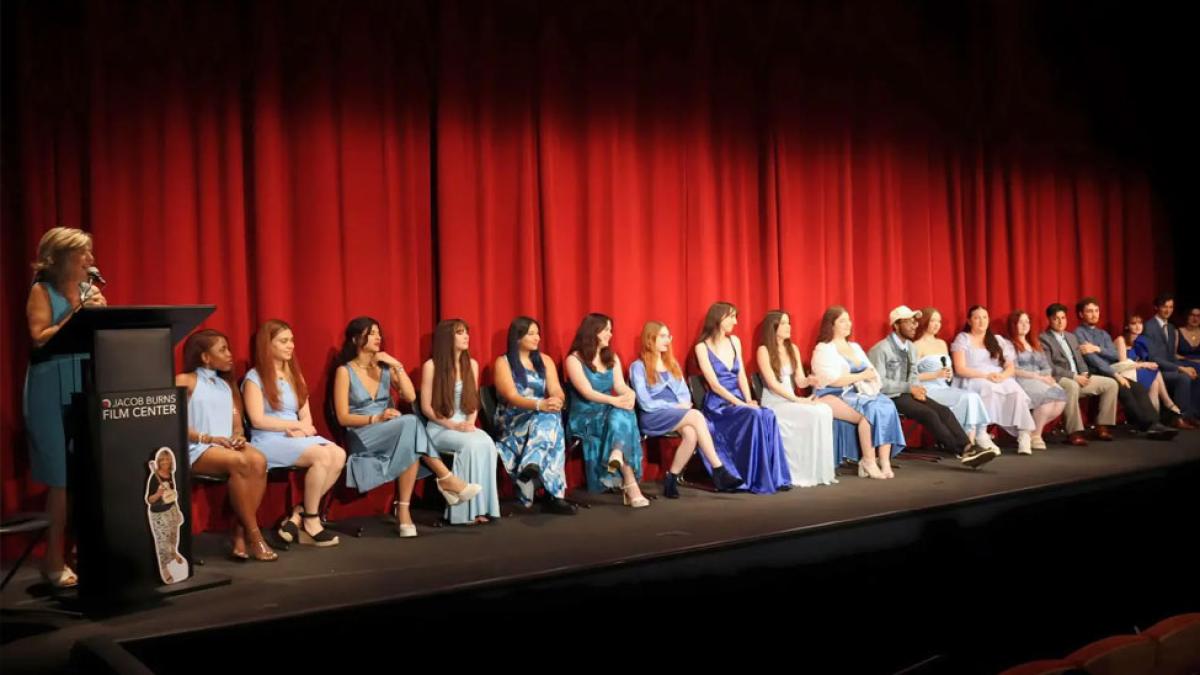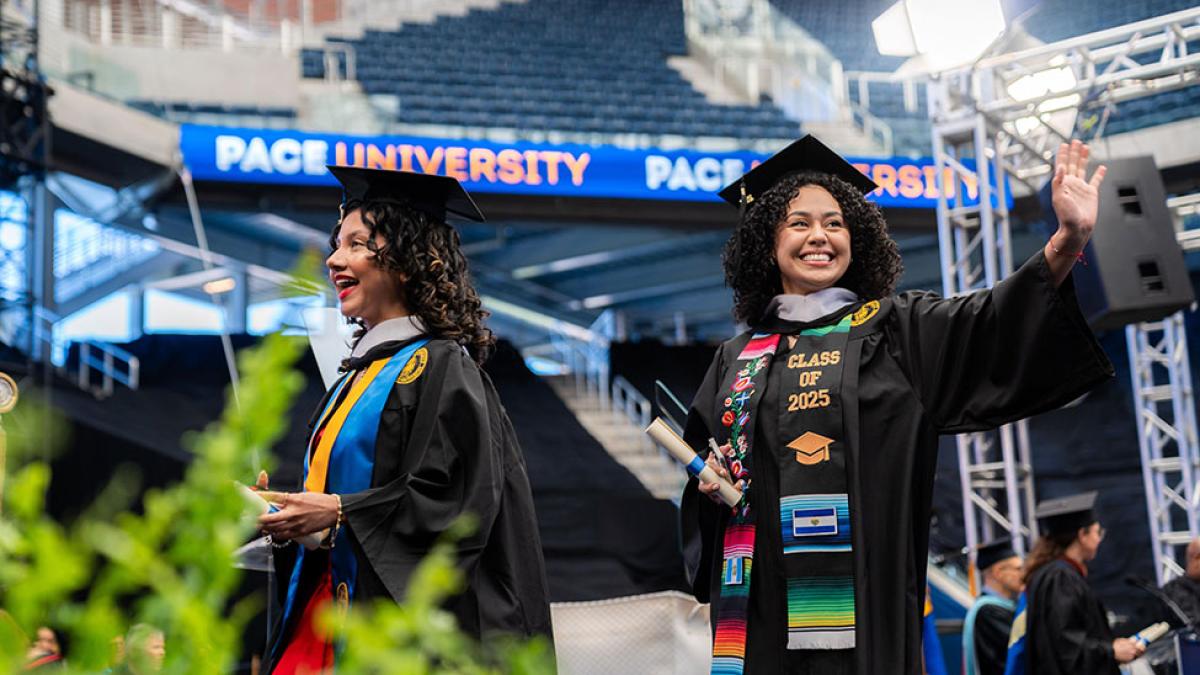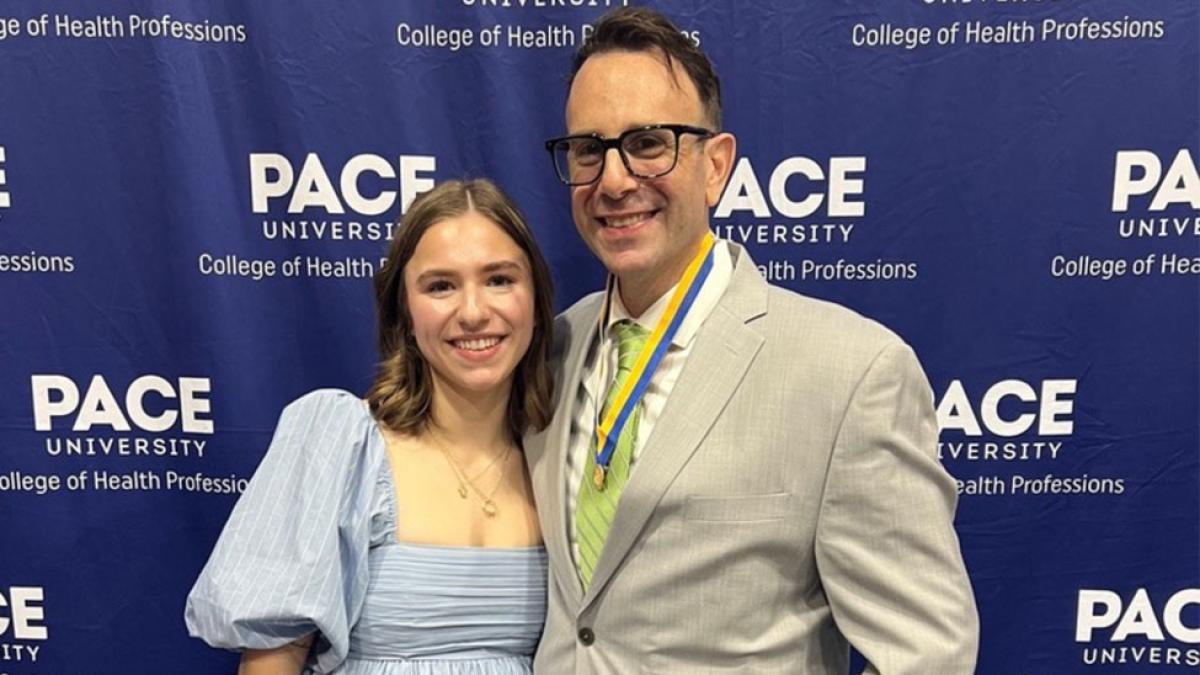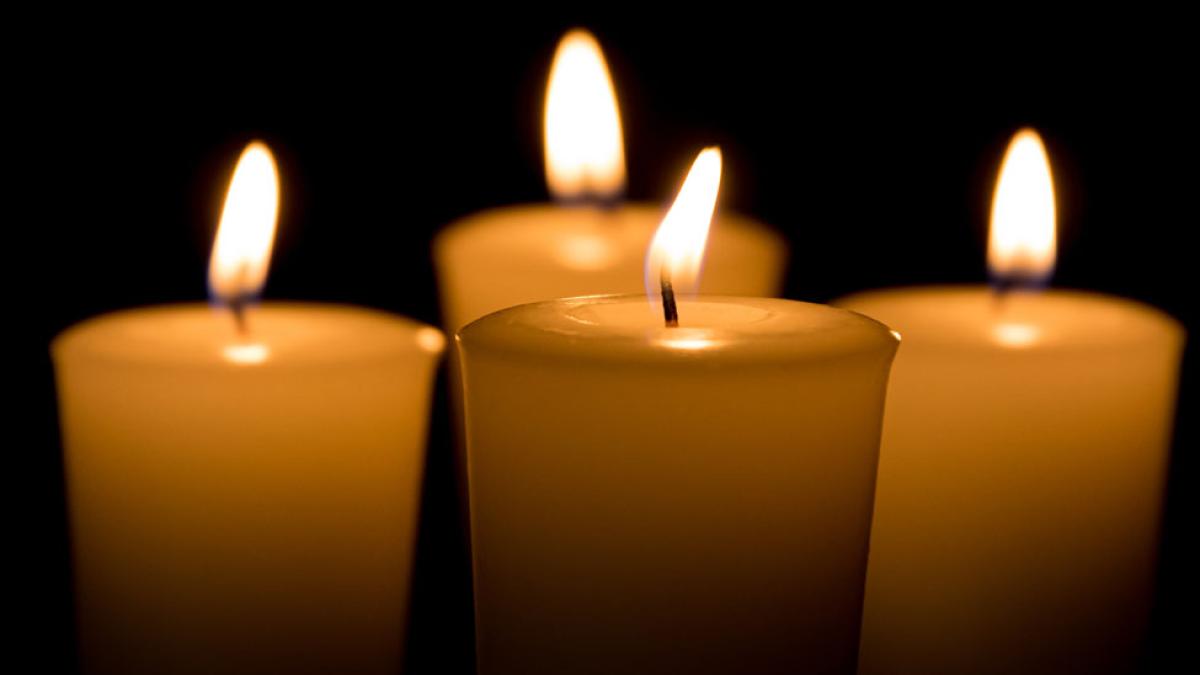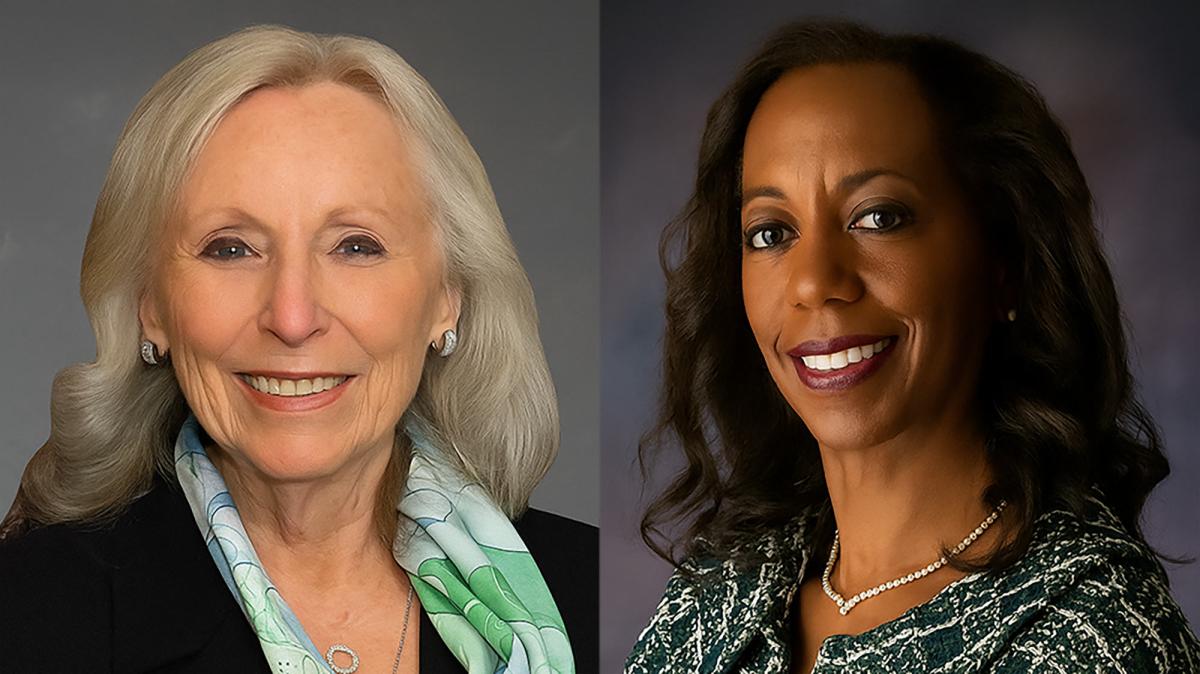
Two New Trustees Bring Passion for Progress and Purpose to Pace
Pace University welcomes two new Board of Trustees members—Barbara A. Abeles, a global manufacturing executive and longtime education philanthropist, and Sabrina A. Griffin ’92, an alumna and corporate diversity leader—whose shared commitment to opportunity, leadership, and student success will help shape the future of the University.
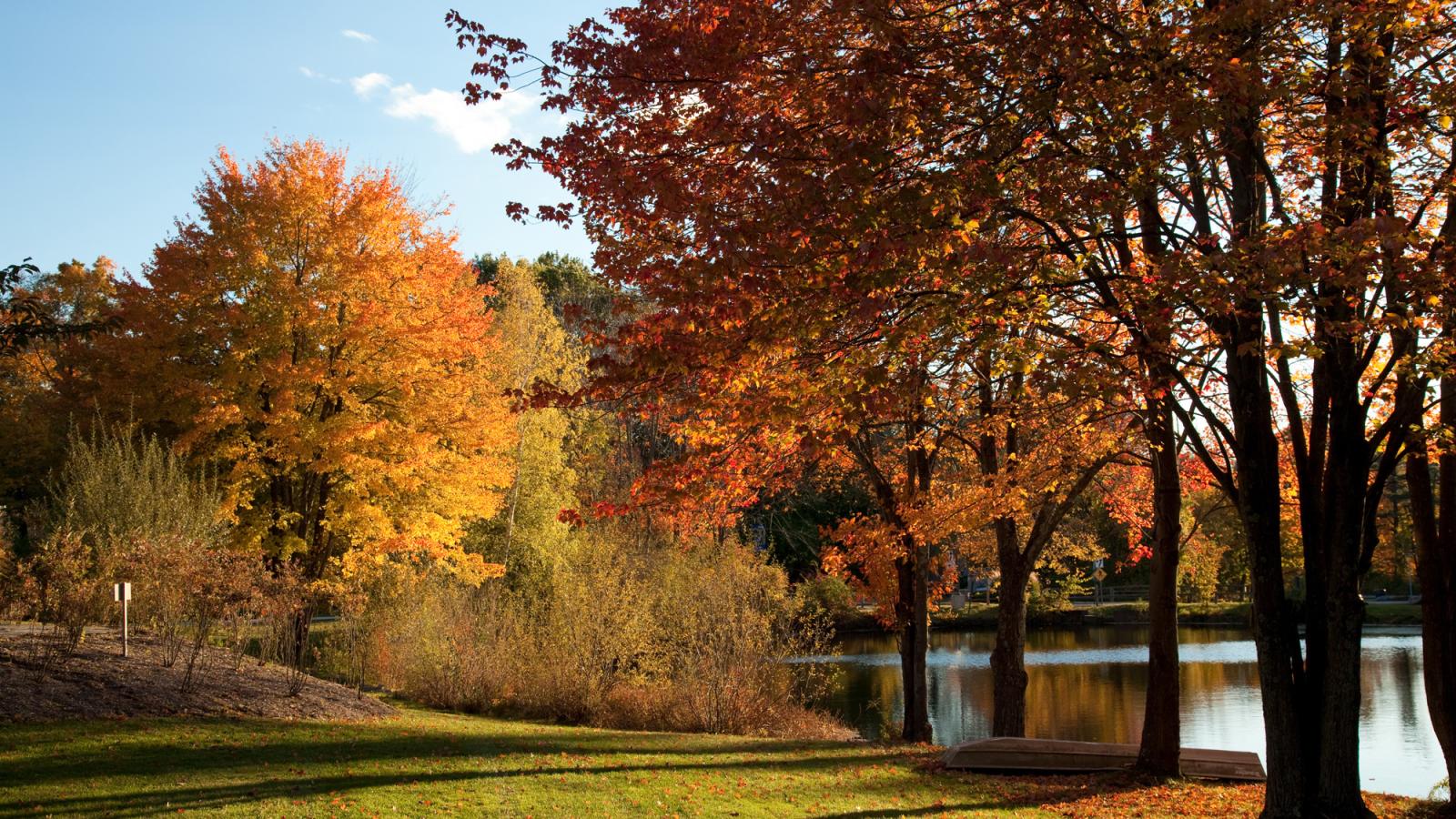
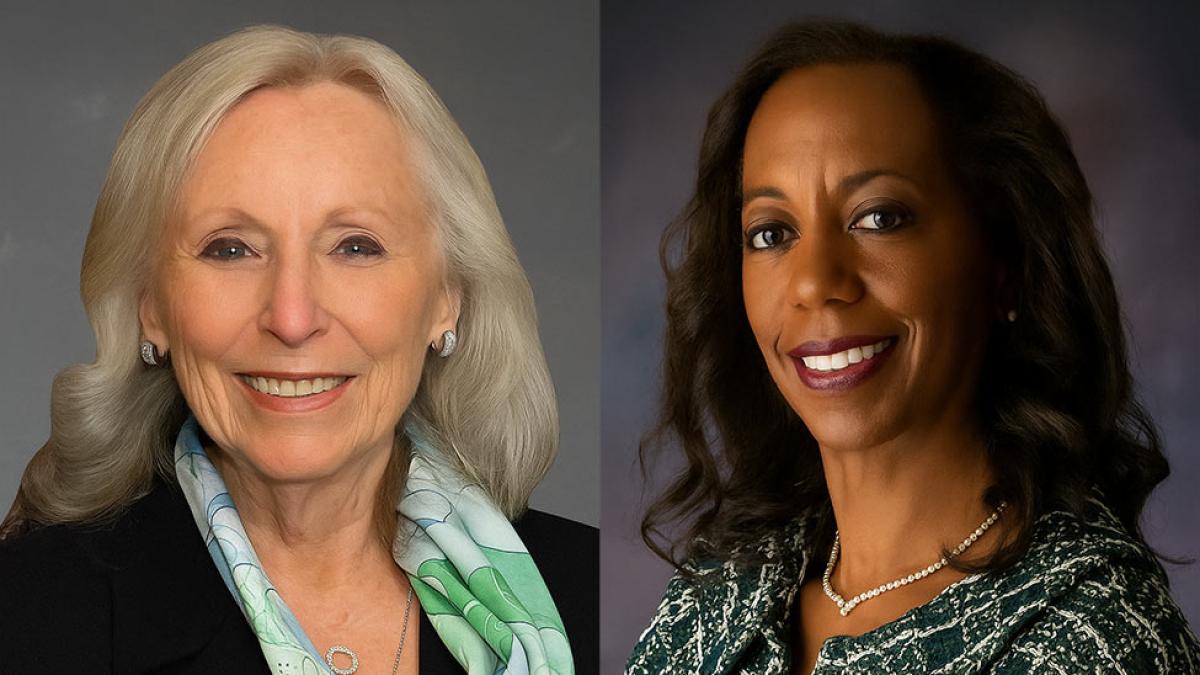
Pace University’s Board of Trustees has welcomed two dynamic new members whose careers reflect a shared commitment to equity, education, and leadership: Barbara A. Abeles and Sabrina A. Griffin ’92. Though their paths are distinct, both women exemplify the university’s mission of expanding opportunity and empowering the next generation.

Barbara A. Abeles is no stranger to breaking ground. As owner, chairman, and CEO of CBL Ceramics Ltd., a Wales-based manufacturer of advanced ceramics for the global electronics industry, she has spent nearly three decades leading global operations in one of the world’s most specialized sectors. Today, her company is one of only three worldwide to produce a rare class of industrial ceramics used in cutting-edge technologies.
A resident of Westchester County, Abeles brings to the board a long-standing philanthropic spirit rooted in education. She serves on the Foundation Board of Westchester Community College and Pace University’s President’s Council. Her support of Pace has been especially impactful: she’s a major donor to the Community Impact Internship Program and established a permanently endowed scholarship to help close gender gaps in the sciences.
“I’ve long admired Pace University’s commitment to creating opportunity through education,” said Abeles. “It’s an honor to join the Board of Trustees and to support a community so dedicated to empowering students to reach their full potential.”
Griffin’s journey to Pace’s Board of Trustees is equally rooted in service and leadership. A proud Pace alumna, she spent more than 30 years at the Chubb Group of Insurance Companies, where she rose to the role of assistant vice president and diversity manager. During her tenure, she pioneered programs designed to support and uplift women, LGBTQIA+ professionals, and communities of color within the corporate workforce.
“I want to help create pathways that meet people where they are—whether they’re students figuring it out or alumni reconnecting after time away. If we design experiences that reflect our community’s needs, we’ll keep building something truly meaningful together.”
Griffin is also the inaugural chair of Pace University’s Alumni Association Leadership Council, a position from which she’s helped strengthen ties between the university and its alumni community. She remains an active member of the President’s Council and serves on the Development, Alumni Relations and Public Affairs Committee.
Her civic engagement extends beyond Pace. Based in St. Petersburg, Florida, Griffin serves on The Mahaffey Leading Ladies committee for the Bill Edwards Foundation for the Arts, helping deliver access to the arts to more than 30,000 students each year. She is also involved with the St. Petersburg Chapter of The Links, Incorporated, where she serves on both the arts and finance committees.
“Joining the Board is an opportunity to give back in a way that’s intentional and inclusive,” Griffin said. “I want to help create pathways that meet people where they are—whether they’re students figuring it out or alumni reconnecting after time away. If we design experiences that reflect our community’s needs, we’ll keep building something truly meaningful together.”
Rob Sands, chairman of Pace University’s Board of Trustees, praised both appointments, saying, “Sabrina and Barbara exemplify Pace’s mission of expanding opportunity—Sabrina through her continued alumni leadership and Barbara through her longstanding philanthropic commitment to education. We are proud to welcome them to the board and look forward to the insight, perspective and leadership they bring to our community.”
With these two appointments, the university deepens its commitment to inclusive leadership, experiential education, and the power of a community that lifts one another up—on campus and far beyond.
More from Pace Magazine
Peek behind the curtain—and the construction fencing—at the bold reimagining of One Pace Plaza East. We asked the design team of this ambitious transformation 10 questions about what’s happening now, what’s coming next, and why it matters. Spoiler: One of the largest cranes on the East Coast makes an appearance.
From NFL reunions and Shark Tank insights to international acclaim and life-saving heroics, the Pace Community is going further—and bringing the world with them. These 10 moments from the past semester are big on energy, even bigger on impact.
From inspiring words by Etsy CEO Josh Silverman to powerful reflections from alumni, community leaders, and first-generation grads, Pace University's two-day Commencement celebration was a moving tribute to resilience, integrity, and the promise of Opportunitas. Meet the voices who lit up the stage—and the futures they’re helping to shape.
Back to the Big Screen
In a world built for solo streaming, the big screen is making a comeback. According to pop culture expert Melvin Williams, PhD, we’re not just watching movies—we’re reconnecting.

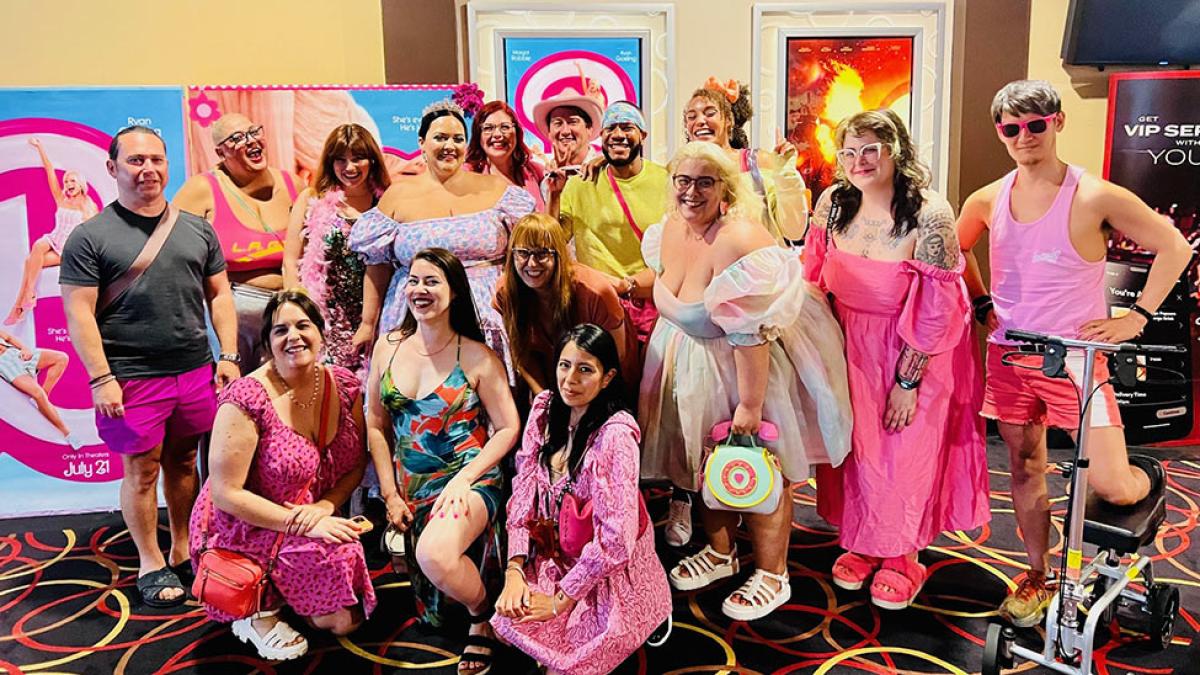
In an age of instant access and solo scrolling, why are people racing back to the movie theater? According to Communications and Media Studies professor Melvin Williams, PhD, it’s about more than just the film. It’s about reclaiming shared stories and experiences. “The broader state of culture is, for many, still a reclamation pursuit,” Williams says. That pursuit of joy, connection, and nostalgia was accelerated by the isolation and disruption of the pandemic.
The COVID-19 shutdown didn’t just pause everyday routines—it fundamentally reshaped how we engage with entertainment and with each other. Movie theaters closed their doors. Broadway went dark. Concerts were canceled. “The pandemic shutdown forced human confinement and a heavy reliance on digital-media-driven entertainment forms and streaming platforms as the entertainment industry experienced a global shutdown,” Williams explains.
The broader state of culture is, for many, still a reclamation pursuit.
For many, screens became the only portal to culture and community. But something was missing. “People desperately craved new entertainment stimuli and avenues for community formation around fan engagement and viewing experiences that mirrored social experiences pre-COVID-19,” he says.
That craving didn’t fade as restrictions lifted—it deepened. Long before lockdowns, viewers were trading the theater for their couches, turned off by ticket prices and overpriced popcorn. But in the aftermath of collective isolation, audiences began to realize that the cost of admission didn’t just buy media access, it bought an experience. According to Williams, “It should come as no surprise that Broadway is experiencing record-breaking attendance numbers for astute plays, movie theater attendance has risen substantially since 2020, and audiences are gathering in large numbers to reclaim previously beloved entertainment consumption habits.”
And then came the blockbusters that did more than bring people back—they made moviegoing an event. Suddenly, seeing a film meant dressing up, posting on social, and making a night of it. “Barbenheimer,” the viral mashup of Barbie and Oppenheimer, transformed from meme to movement, as fans turned out for a back-to-back spectacle.
In the case of Barbie, we witnessed film’s pop culture engagement at its finest.
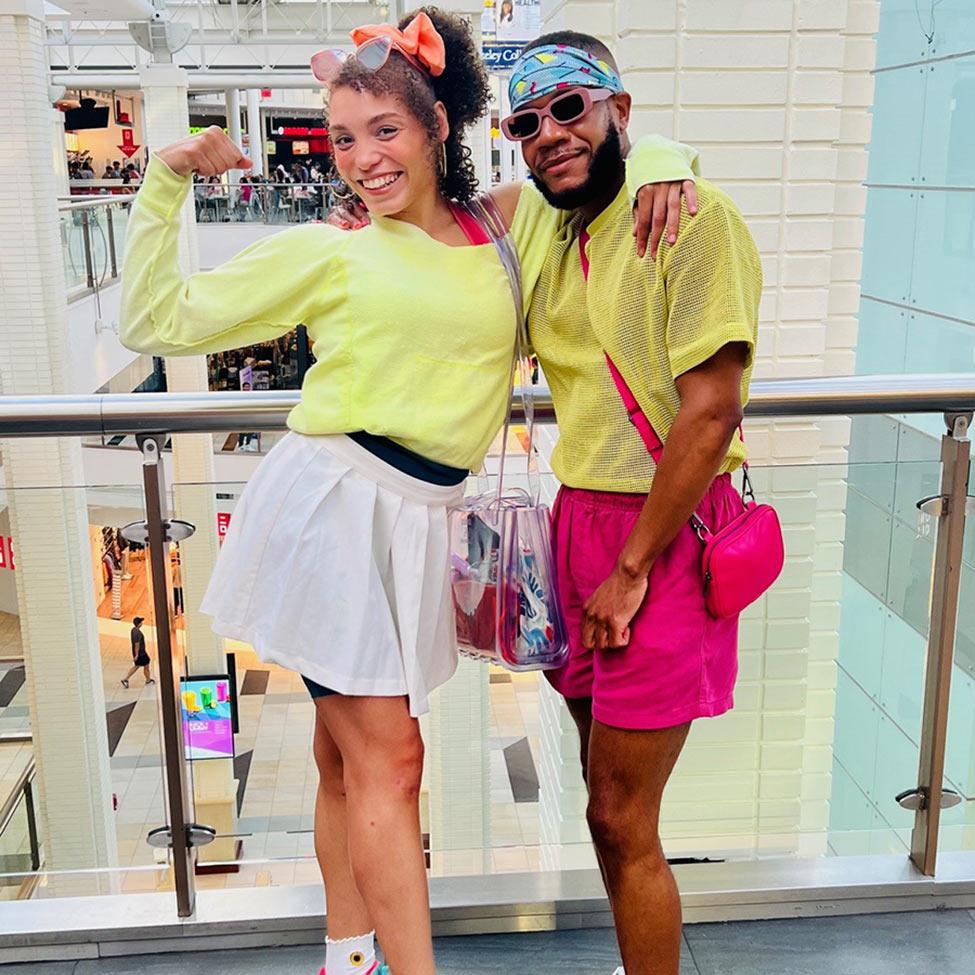
Barbenheimer Weekend and later, the premiere of Wicked: Part One, marked a cultural return to theaters and demonstrated the public’s desire for culture and community. “In the case of Barbie, we witnessed film’s pop culture engagement at its finest,” Williams says. “Besties and friend groups marched to the theaters in Barbie-themed costumes, purchasing Barbie AMC merchandise exclusives, and embracing pop culture’s enduring legacy of eccentricity, expression, and nostalgia.” The movie was only part of the appeal. Dressing up, going with friends, and being part of the moment became the real draw.
Wicked brought a different energy—one rooted in nostalgia. “Wicked showcased pop culture nostalgia’s power as a media product,” says Williams. “The film simultaneously resurrected audience interests in Gregory Maguire’s 1995 novel Wicked: The Life and Times of the Wicked Witch of the West and the iconic Tony Award-winning musical Wicked.”
Watching a film in theaters inherently creates a different experience than video on demand. “Audiences are seated theater-style, positioned with clear foci on the big screen, and the lights are dimmed.” Williams breaks down this experience, saying, “These factors spark temporary departures from reality fueled by a fascination with movie characters and scopophilia, or rather the pleasure of looking at and sometimes even objectifying the characters.”
But for many, the biggest difference isn’t just how we experience the media—it’s the feeling of belonging. Says Williams, “You are removed from your familiar, at-home location and placed in an environment designed to create a distinct viewership experience and voyeur.”
Pop culture moments like these film events extract us from previously depressive moments and refuel us with hope for the arts and humanity!
For many, that’s the real difference. It’s not just about how we watch—it’s about watching together. The return to theaters is one part of a cultural reset. “Pop culture moments like these film events extract us from previously depressive moments and refuel us with hope for the arts and humanity!” says Williams.
That hope is exactly what brings people back—not just for the stories on screen, but for the feeling they carry home. “The thing I love about pop culture and why I teach it at Pace University and for my CMS 245: Communication and Popular Culture class (shameless plug, but hey, who would I be if I didn’t!) is its power to inspire joy, perseverance, and victory for audiences.”
In an era defined by separation, pop culture is doing what it does best—bringing us back together.
More from Pace Magazine
From inspiring words by Etsy CEO Josh Silverman to powerful reflections from alumni, community leaders, and first-generation grads, Pace University's two-day Commencement celebration was a moving tribute to resilience, integrity, and the promise of Opportunitas. Meet the voices who lit up the stage—and the futures they’re helping to shape.
Not everyone gets to say they went to college with their dad—and helped inspire his second act. Discover how Sofia Speranza ’27 and her father Frank found their calling in nursing, together.
The world is changing fast, and Pace University is preparing the leaders who will change it for the better. From healthcare to public service to law, our students aren’t just keeping up—they’re stepping up, driven by purpose, compassion, and the power to lead the future.
Biomechanics and Bone Maps: What Bats Can Teach Us About Ourselves
Biology major Kelly Ng and Professor David Boerma are using 3D modeling and evolutionary theory to uncover how the structure of our limbs is shaped by the way we move. Their research explores surprising parallels between humans and Egyptian fruit bats—and may even have implications for injury prevention and medical design.
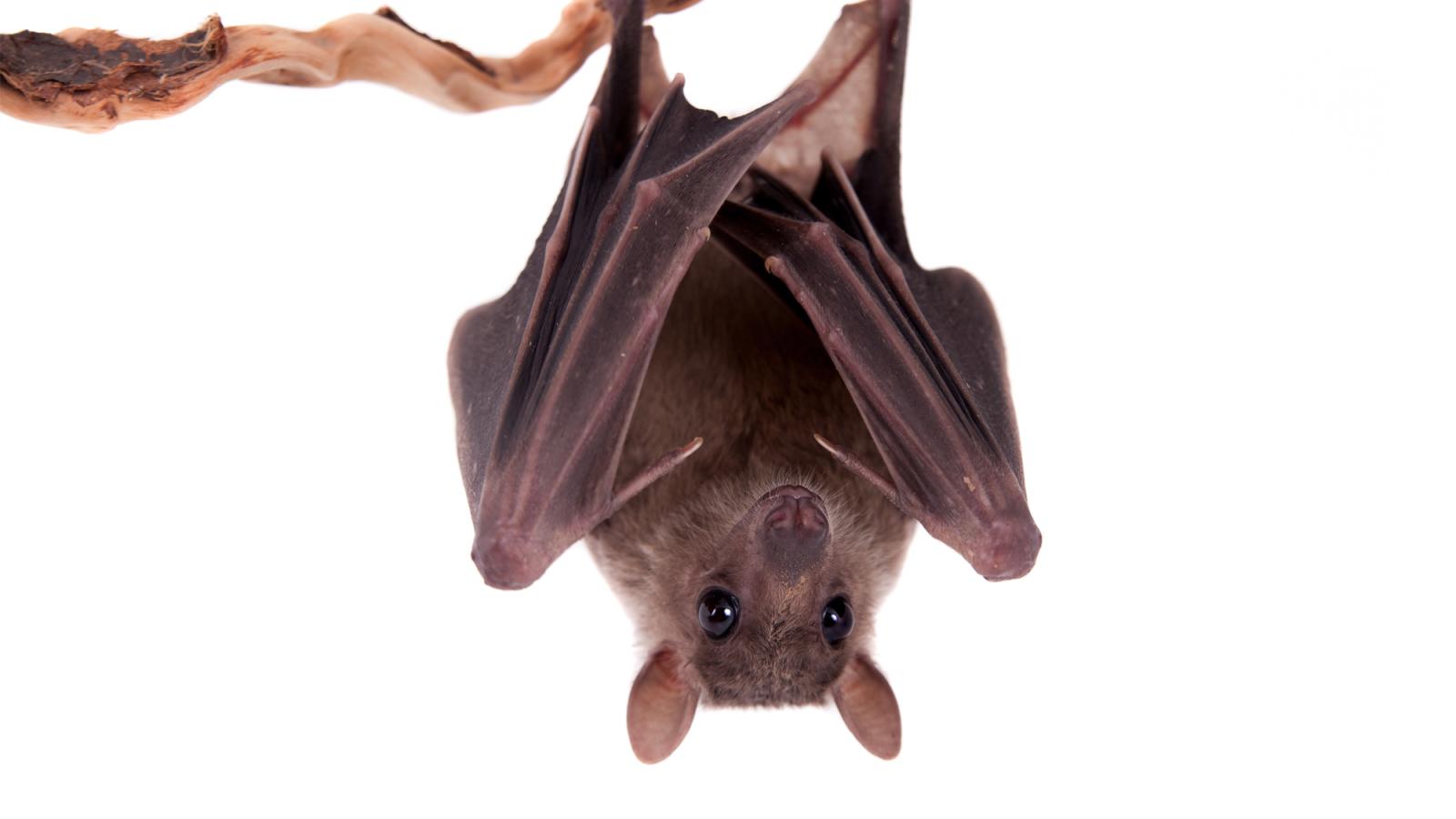
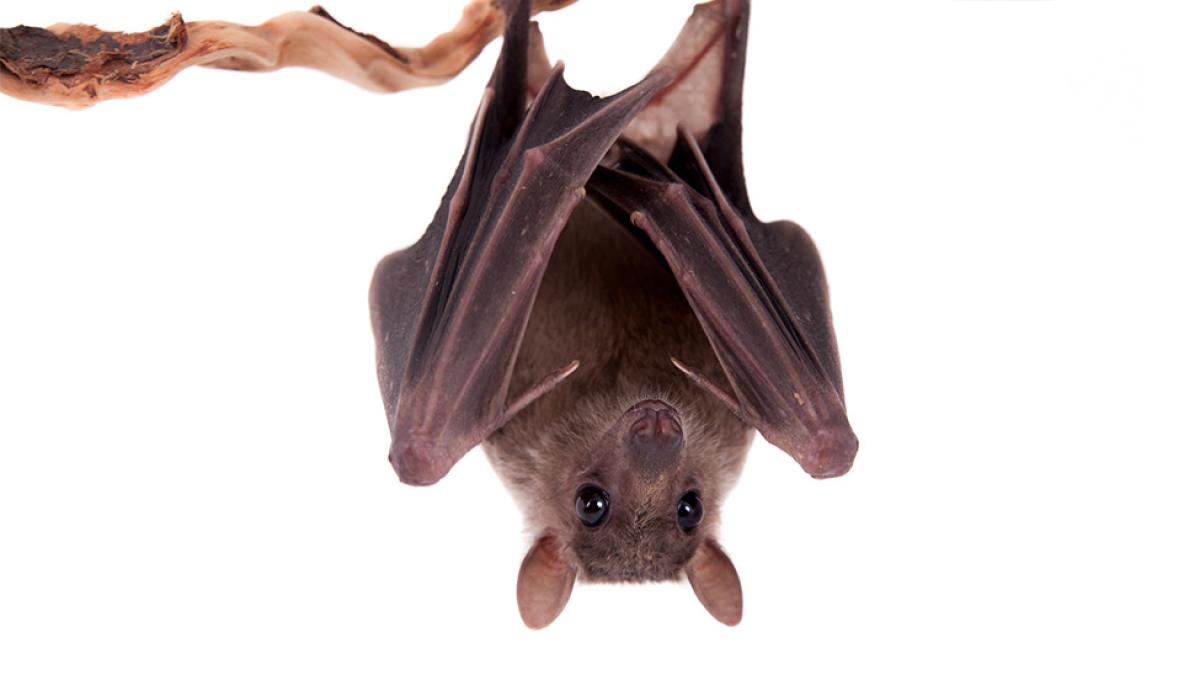
When Kelly Ng ’26, a biology major from Perth, Australia, joined the Provost’s Student-Faculty Undergraduate Research and Creative Inquiry program, she was looking to grow as a scientist and dive deeper into the kind of hands-on, curiosity-driven work that goes far beyond the walls of the classroom.
“I applied because it offered me an opportunity to grow my skills as a researcher through its provided resources and academic community,” she explained. “I was interested in joining a network of students and faculty engaged in independent research, where I could learn from others’ experiences in research while developing my own.”
“Bat flight research is important in its own right, but being able to use it as a means toward connecting with my students and giving them real ownership over part of their education has got to be one of my favorite parts of being a professor.”
With the mentorship of David Boerma, PhD, assistant professor of Biology at Pace and a Research Associate at the American Museum of Natural History, Kelly found herself working on a deceptively simple question: how do bones evolve to meet the needs of how we move? It’s a question that spans biology, anatomy, biomechanics—and in this case, flight.
Together, they are investigating limb structure in the Egyptian fruit bat, a large mammal with a 20+ inch wingspan whose anatomy offers a unique counterpoint to humans. While humans rely on repetitive use of our legs to walk and run, bats rely on their forelimbs (wings) for flight—a repetitive motion in a different part of the body. Do bats show the same pattern of limb function and bone structure that humans do, just flipped?

“Working with Dr. Boerma, I’m creating 3D structures of leg bones in Egyptian fruit bats to understand how their structure is affected by their function,” said Kelly. “In humans, our legs have less variability because they’re mainly used for walking, while our arms show more variability since we use them for a range of different tasks. We’re studying Egyptian fruit bats to see if this pattern is the same in bats but for the opposite limbs.”
“If a certain kind of animal has evolved to move a certain part of its skeleton in the same way, over and over again throughout its life (e.g., how your legs move to walk), then because those bones experience repetitive forces, they should end up having extremely consistent shapes across all the individuals of that kind of animal,” Professor Boerma explained. “We’re asking, ‘this idea sounds logical, but is it really true?’”
“Being able to see and segment the structures myself made it easier to grasp how limb shape relates to movement,” Kelly said. “It helped me understand those concepts more clearly than I could through lectures or textbooks alone.”
For Kelly, the work has been both technical and transformative. A typical day includes loading CT scans of bat specimens into 3D Slicer software, carefully segmenting bones like the femur, tibia, and pelvis, and cleaning digital models to prepare them for analysis. While the learning curve was steep—“the process of segmenting my first bat took a lot of troubleshooting,” she recalled—the experience pushed her technical skills and built confidence.
“Being able to see and segment the structures myself made it easier to grasp how limb shape relates to movement,” Kelly said. “It helped me understand those concepts more clearly than I could through lectures or textbooks alone.”
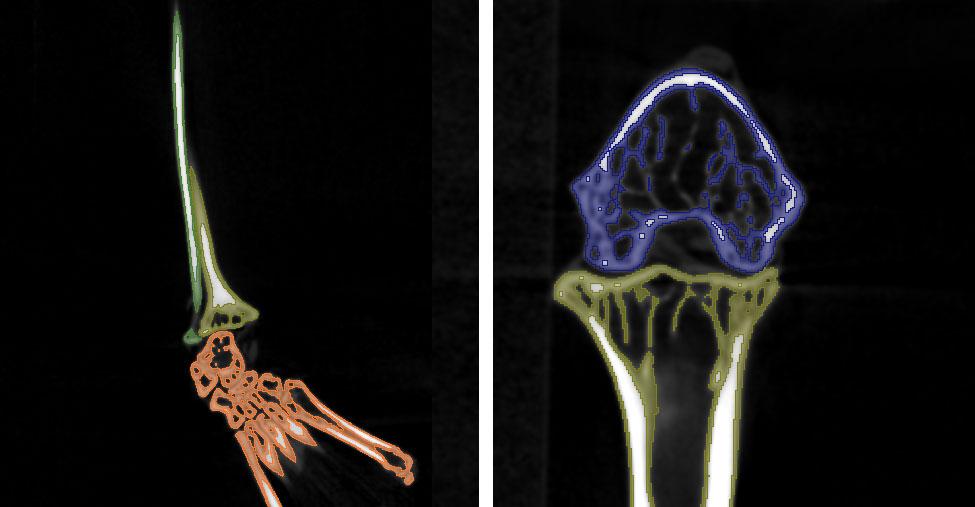
For Boerma, mentoring students like Kelly is one of the most meaningful parts of his work.
“Bat flight research is important in its own right, but being able to use it as a means toward connecting with my students and giving them real ownership over part of their education has got to be one of my favorite parts of being a professor.”
He speaks of Kelly’s early commitment to the project with awe:
“I gave her a 60-page master’s thesis from one of our collaborators to read…and she could talk about it with me like a collaborator herself, all before even beginning the project. I can’t find the words to express to you how much fun that kind of interaction with a student is for a professor.”
Beyond bats, biomechanics, or bone variation, this kind of faculty-student partnership is what the Provost’s program is all about. “Asking for help is an important part of research,” Kelly said. “Being open and honest about what you don’t know does not mean you’re less capable—it’s an important step in the learning process.”
As their research moves into the analysis phase—potentially laying the groundwork for medical insights into human injury risk or the evolution of vertebrate anatomy—Boerma sees something more fundamental taking shape.
“Kelly is growing into the kind of student whose work is now more than just a synthesis of what she reads in a textbook; it’s the kind of thing that could become part of a textbook in the future.”
More from Pace Magazine
From inspiring words by Etsy CEO Josh Silverman to powerful reflections from alumni, community leaders, and first-generation grads, Pace University's two-day Commencement celebration was a moving tribute to resilience, integrity, and the promise of Opportunitas. Meet the voices who lit up the stage—and the futures they’re helping to shape.
The world is changing fast, and Pace University is preparing the leaders who will change it for the better. From healthcare to public service to law, our students aren’t just keeping up—they’re stepping up, driven by purpose, compassion, and the power to lead the future.
In a world built for solo streaming, the big screen is making a comeback. According to pop culture expert Melvin Williams, PhD, we’re not just watching movies—we’re reconnecting.
Michael Gelchie '90: Leadership With Global Reach
Days after graduating from Pace’s Lubin School of Business, Michael Gelchie ’90 began his first job at Louis Dreyfus Company. Thirty years later, he became the company’s CEO, leading a global operation spanning more than 100 countries.
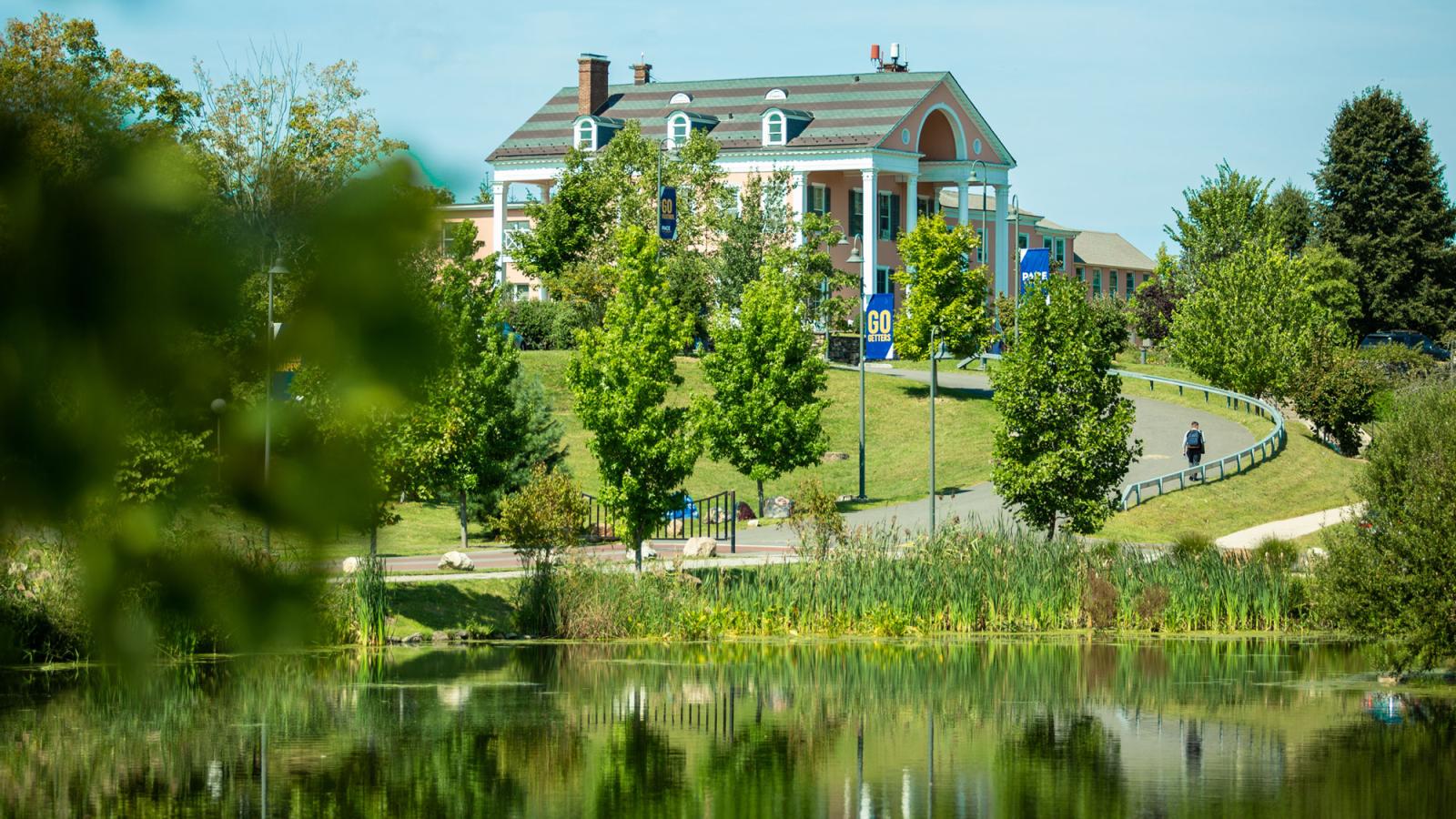
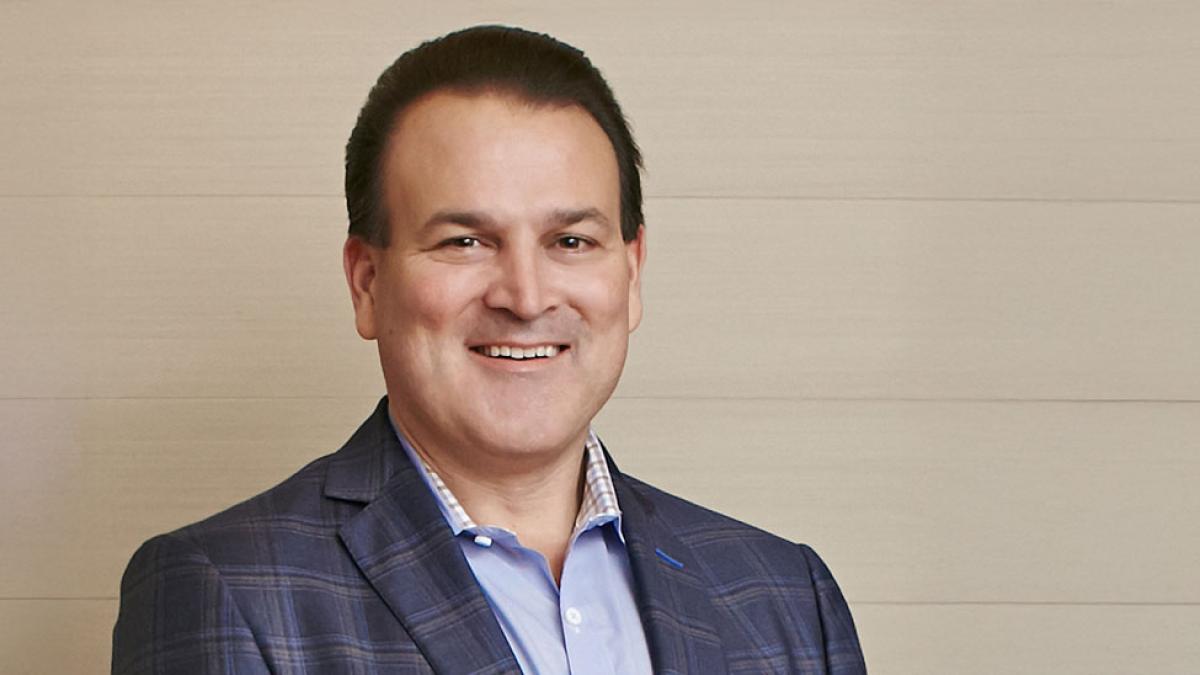
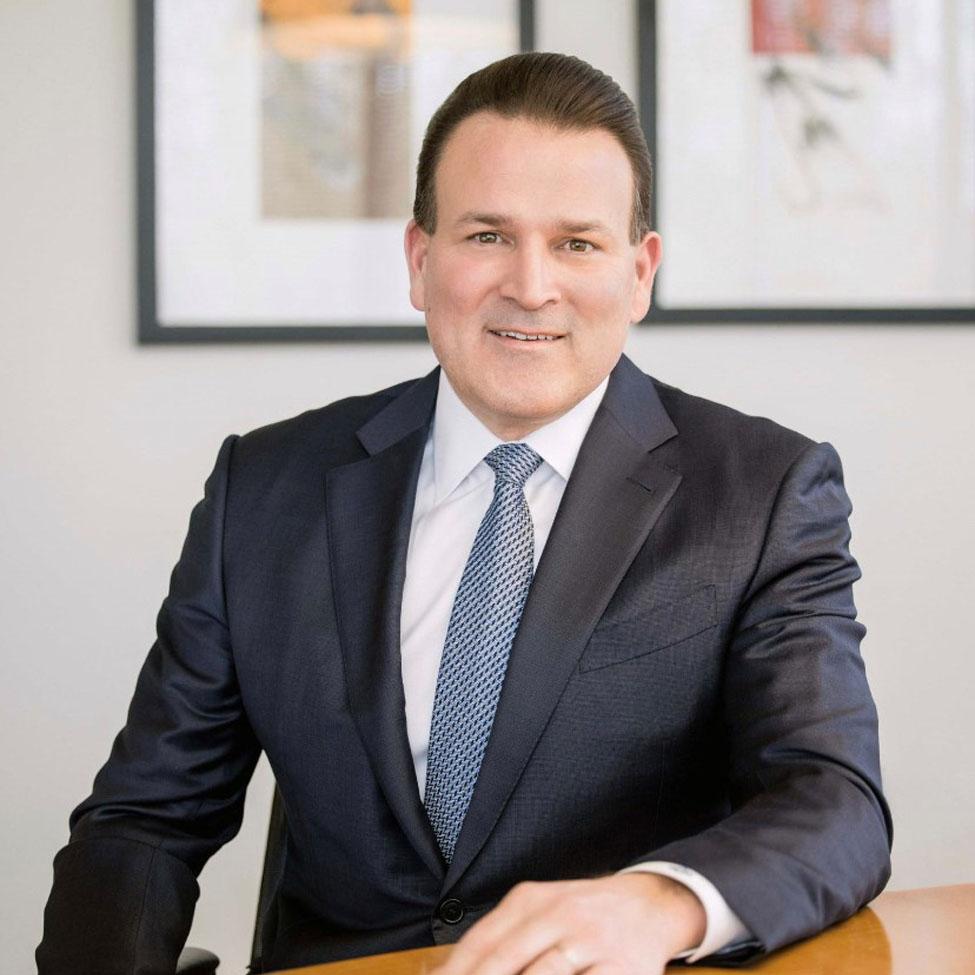
As chief executive officer of Louis Dreyfus Company (LDC), a leading international merchant and processor of agricultural goods, Pace University Lubin School of Business alumnus Michael Gelchie ’90 has a big job. Overseeing some 20,000 employees worldwide, commercial activities in more than 100 countries, and globe-spanning operations that process and transport nearly 100 million tons of products each year, his role is a daily adventure—one that takes him to the far corners of the world, crisscrossing the vast networks and extensive partnerships that make up LDC’s truly global business.
Michael’s 2020 appointment as CEO of LDC was decades in the making—a journey that began in the accounting department on Pace University’s Pleasantville Campus.
As an ambitious college student fascinated by the burgeoning technological revolution sweeping the 1980s, Michael charted his academic course through Pace’s accounting and information systems program. He found it was the perfect marriage of his interests, combining a conventional accounting education with principles of finance and a deep exposure to the technological mechanisms used to retrieve, organize, and analyze financial data.
At the urging of Pace’s Career Services office, Michael also enrolled in several classes outside his degree program, allowing him to qualify for the key certification and licensing exams he needed to successfully launch his career.
“Eileen Murphy in Career Services was quite instrumental in guiding me toward that pragmatic approach,” Michael said. “I ultimately did graduate with an accounting and information systems degree, but because of those extra courses, I was also able to sit for the CPA, CMA, and CIA exams. Those experiences were extremely helpful.”
As he was preparing to receive his degree from Pace, Michael was also diving headfirst into the job search. In the months leading up to graduation, he estimates he sent out seventy-two résumés: “And this was a time when you had to sit down and typewrite every individual cover letter,” he said.
The hard work soon paid off. Just weeks before graduating, Michael landed a job through a connection he’d made at Arnold Foods, where he’d held summer internships over the two previous years. That first job was a junior internal audit position at LDC—the very same company he would be appointed to lead as CEO thirty years later.
“I graduated in May of 1990, and I started at LDC that same June,” he said. “It was an intriguing position—not necessarily what I thought a young person in accounting would be doing. But it was extraordinary to see how many bright, intelligent people were in that environment. Coming into the field of agricultural commodities trading, learning that language, learning auditing at the same time—there was a lot of information to process, but it was an amazing learning experience.”
Michael held a range of positions at the company over the next twenty years, from trading and merchandising to managing LDC’s sugar, rice, and cocoa businesses. In 2008, he helped spearhead the development of the Louis Dreyfus Investment Group as a senior portfolio manager. After a stint away from the company, he returned to LDC in 2019 as global head of coffee and was soon thereafter appointed chief operating officer.
“Establishing our endowed scholarship was an important way for us to extend the same opportunities we received at Pace to current and future students,” Michael said.
He assumed the role of CEO at LDC in July 2020, the culmination of a three-decade agri-commodities career that began just days after he received his Pace diploma. It was a full-circle moment, but there was precious little time for reflection—he was stepping into a role of staggering responsibility in the middle of a global pandemic, as compounding crises were forcing industries across the globe to reckon with a strange and uncertain new reality.
It was among the most complex and challenging periods of his career, he said—a time defined by difficult and potentially existential decisions with vanishingly slim margins for error. But as a leader tasked with navigating the turmoil of the pandemic and engineering a strategy for forward progress, Michael was determined to manage the uncertainty and translate challenges into opportunities.
“When I was appointed CEO, everything was happening through screens,” he said. “I had the chance to learn the role and the business in an incredible way, because it was all being delivered through video. In a normal environment, I might have had to travel around the world for three years to absorb the amount of information and material that I was able to take in virtually at that specific point in time.”
For Michael, the key to successfully leading LDC through challenges like the pandemic—and further elevating the company as one of the world’s foremost agricultural commodities trading firms—is simple: it’s always about the people. It’s about cultivating a sense of connectivity across his leadership team and throughout the organization’s 20,000 employees—a sense of collective purpose and achievement, a shared culture where everyone understands the mission and everyone’s contributions are valued.
In short, Michael believes that investing in people generates extraordinary outcomes. It’s why he has worked to strengthen the culture of mentorship and community at LDC, and it’s why he has provided life-changing philanthropic support to the next generation of leaders—particularly those pursuing their education at his alma mater.

In 2022, Michael and his wife, Pace alumna Linda Gelchie ’94, established the Gelchie Family Scholarship at Pace University, a permanent endowed fund designed to provide sustained, transformative aid to Pace students, with a specific focus on students who may experience learning challenges.
“Establishing our endowed scholarship was an important way for us to extend the same opportunities we received at Pace to current and future students,” Michael said. “Linda and I have seen in our own lives the doors that can be opened through a strong education, and it means a great deal to us to be able to create those possibilities for others.”
In addition to his scholarship support, Michael is also committed to building meaningful personal relationships with students who—inspired by success stories like his—see a Pace education as their pathway to building careers of purpose.
In the spring of 2025, Michael returned to the Lubin School—the place his journey began—to share his experiences with a group of hard-working finance majors. Motivated by the same spirit of mentorship that animates his guidance of younger colleagues at LDC, Michael spoke to the students about his role, his story, the opportunities available in the agri-commodities industry, and the principles that inform his own theory of effective leadership: building a team you can rely on, developing strong communication skills, walking the talk, and—perhaps most importantly—committing to a lifetime of learning.
It's that untiring dedication to learning that keeps that best leaders sharp, Michael said. And it’s a precept he keeps at the center of his own life: He has recently committed to completing an MBA program at Pace, with plans to earn his second Lubin School degree by the end of 2026.
“For people who want to be leaders, what I’d say is that you have to embrace the notion of continuous learning,” he said. “There’s always something new out there to learn, and great leaders always keep their minds open to the ways our businesses and our world continue to evolve.”
More from Pace Magazine
From inspiring words by Etsy CEO Josh Silverman to powerful reflections from alumni, community leaders, and first-generation grads, Pace University's two-day Commencement celebration was a moving tribute to resilience, integrity, and the promise of Opportunitas. Meet the voices who lit up the stage—and the futures they’re helping to shape.
Not everyone gets to say they went to college with their dad—and helped inspire his second act. Discover how Sofia Speranza ’27 and her father Frank found their calling in nursing, together.
In recent months, the Pace University community has said goodbye to several cherished members whose lives and legacies left an indelible mark on our institution. These alumni, faculty, staff, and friends exemplified the values of leadership, service, scholarship, and care. We honor their memory and celebrate their enduring contributions to the Pace Community.
Heritage and Heart: The Evolution of T-Bone
From real dog to campus icon, our mascot has always set the pace. Discover how T-Bone wagged his way into Pace University history—and into hearts far from the New York metro area.
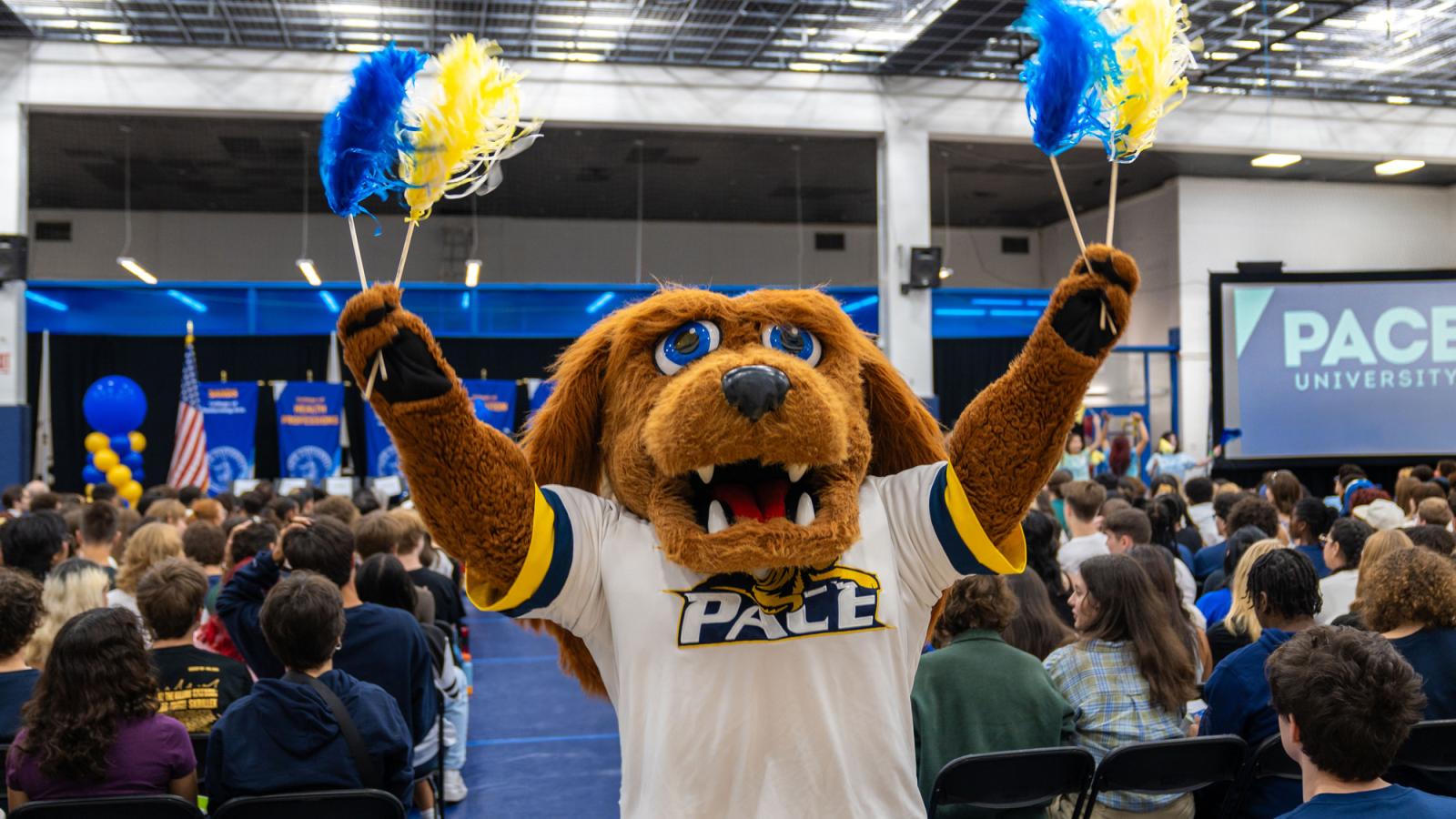
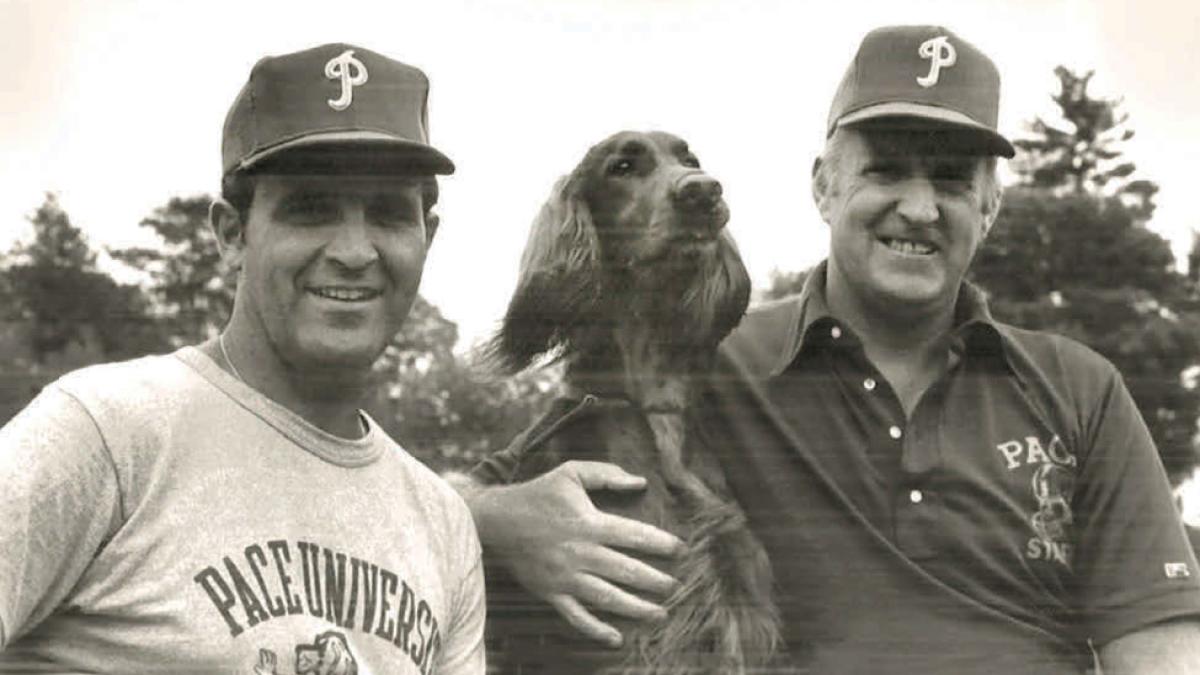
Special thanks to Ellen Sowchek, University Archivist at Pace University, for providing historical context, photographs, and invaluable research support.

You’ve seen him at Commencement, cheering courtside—maybe even popping up in a selfie or two. T-Bone, Pace University’s ever-loyal Irish Setter mascot, is as much a part of our university milestones as the Setters name itself.
But what some alumni may not know is just how deep the Setter legacy runs. In April 1949, “Setters” was chosen as the name for our athletic teams through a student contest—fitting, given Pace students’ reputation for setting the pace in everything they do. The winning prize? Two tickets to Death of a Salesman, then just making waves on Broadway.
The idea of the Setter—graceful, intelligent, energetic—took root quickly. In the decades that followed, real Irish Setters began appearing on the sidelines, unofficially standing in as mascots. One of the earliest was owned by Dr. Edward Mortola, the third president of Pace University, who served from 1960 to 1984. While the dog’s name has largely been lost to history, Mortola’s late wife, Doris, believed the Setter was named Red. His presence is documented and remembered as an early embodiment of the school’s spirit.
Eventually, that spirit leapt off the leash and into costume. A series of mascot suits followed, each one evolving in shape, swagger, and Setter style. From scrappy first attempts to the high-energy, red-furred T-Bone of today, the mascot has always embodied what it means to be Pace Proud.
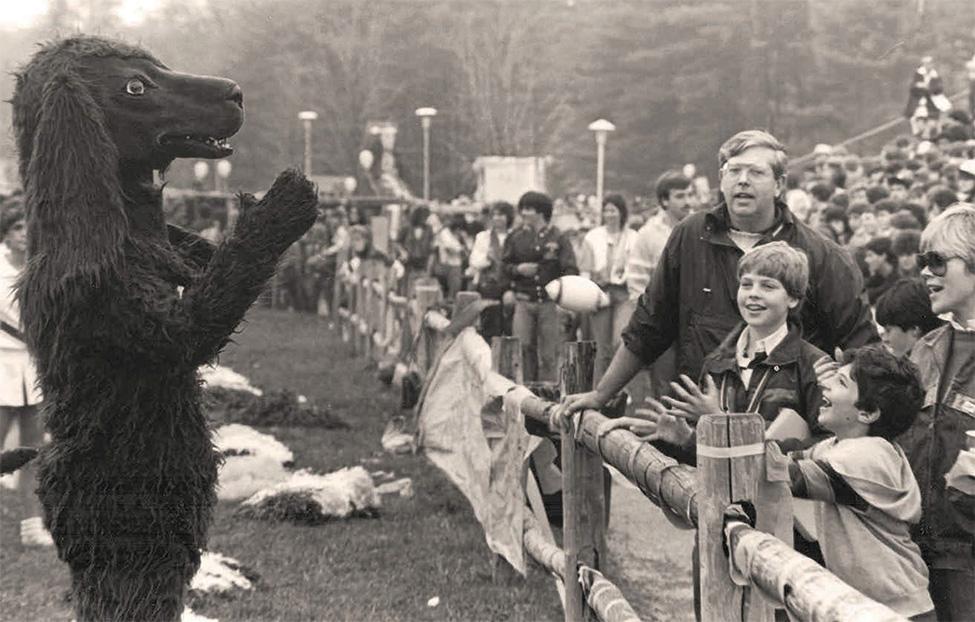
T-Bone officially made his debut on Pace’s New York City Campus in 2013, where he quickly adapted to city life by appearing not at athletics events but at student-centered activities such as Fall Fest, Homecoming, Orientation, and Commencement—a tradition that continues today.
Pace University’s first official mascot leaves behind an everlasting legacy.
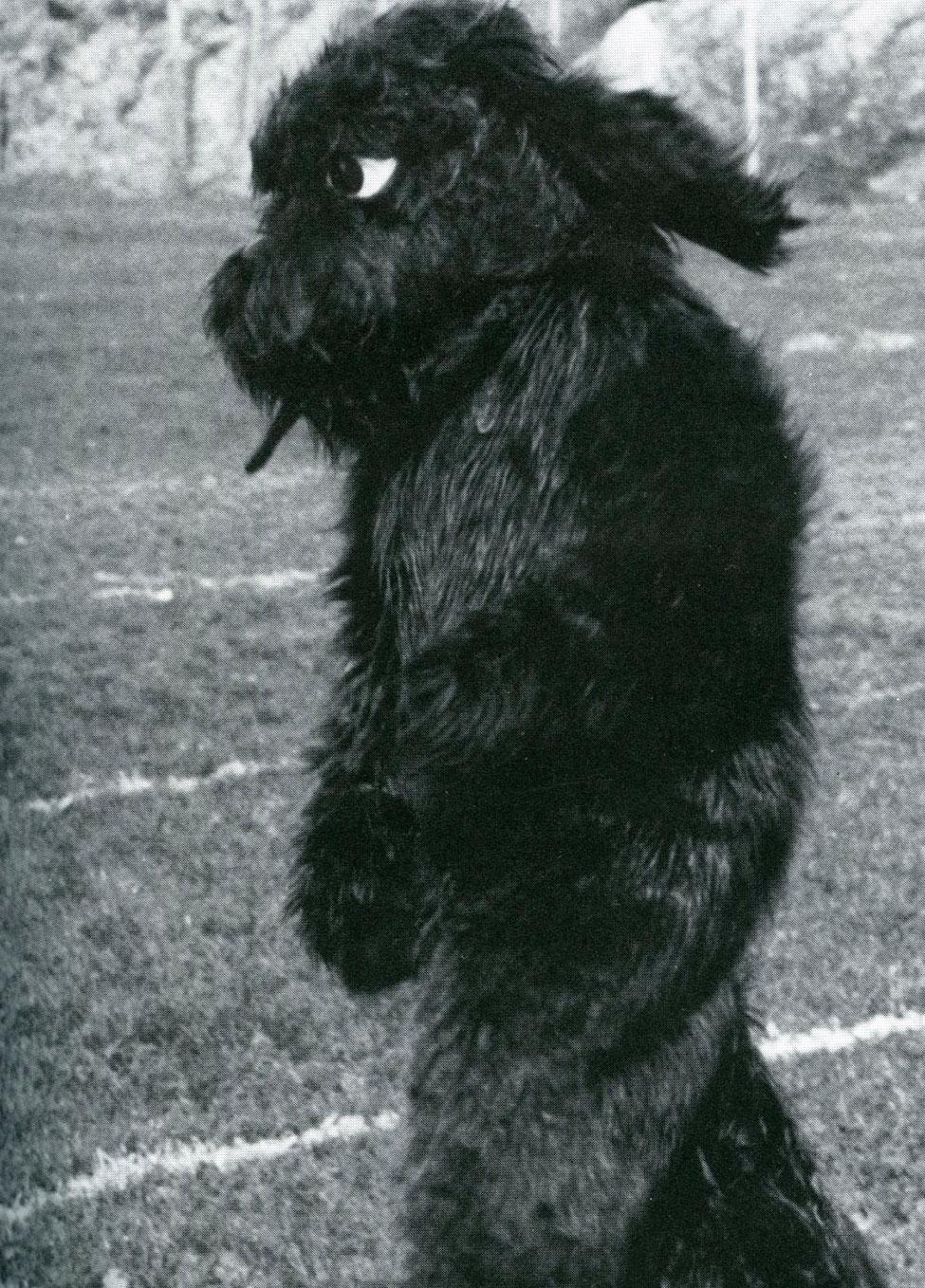
The current T-Bone costume—first introduced in 2012—is still in use. Made up of six costume pieces and topped with a 30-pound carved foam head, it is a physically demanding ensemble. The costume is hot, has limited visibility, and requires full-body expression rather than speech. For this reason, T-Bone is typically accompanied by a handler—a student or staff member who guides the mascot around campus, acts as their eyes and ears, and helps them stay cool (in every sense of the word).
In fact, the complexity and dedication behind the costume were documented in the 2013 issue of The Legend yearbook, which featured a behind-the-scenes profile of the Setter. The yearbook staff wrote: “Pace University’s first official mascot leaves behind an everlasting legacy. The Setter is a direct representation of Pace University. Therefore, by actively engaging in school events and bringing students together, the Setter is not only creating relationships with the students but allowing for students to have a closer relationship with Pace University.”
Indeed, T-Bone is more than just a mascot—he is a symbol of school spirit, community, and continuity. Though the concept of a mascot at Pace has evolved over the decades, one truth remains: Setters always set the pace.
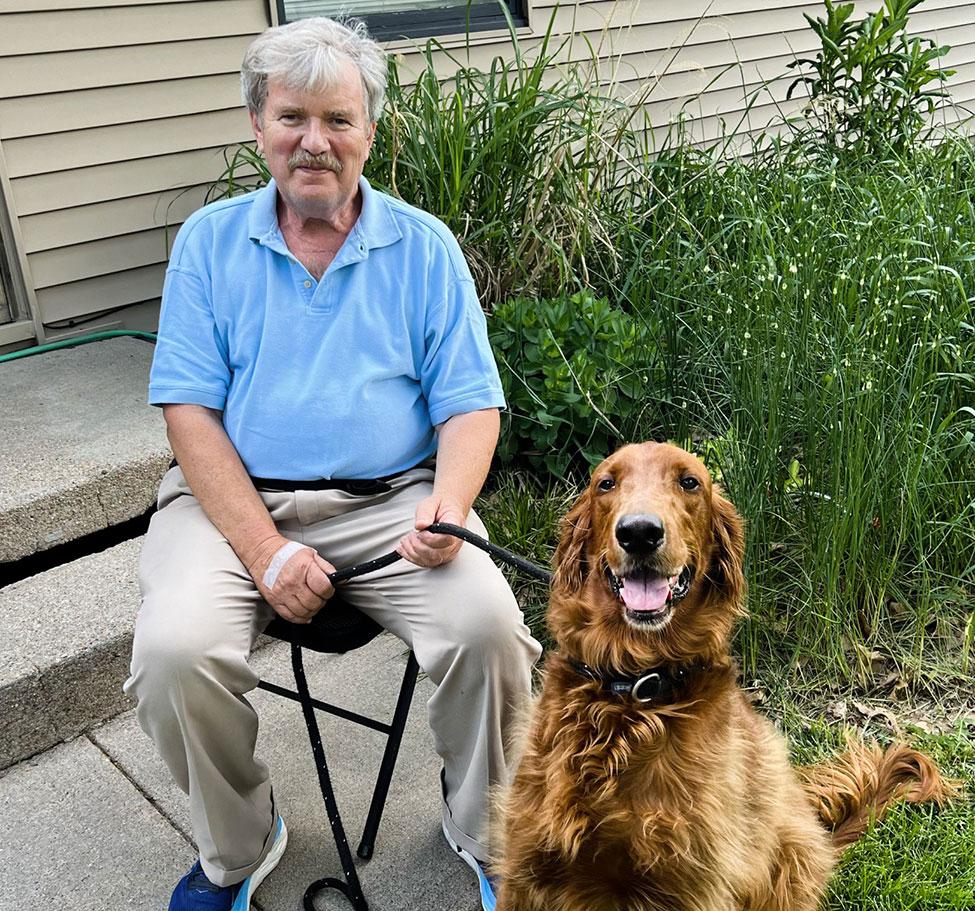
And his fandom? It has gone national.
Enter Tom Nipper of Omaha, Nebraska, and his rescue Irish Setter, Finnegan. Tom is not much of a sports fan, nor is he a Pace alumnus—but when he discovered our mascot was an Irish Setter like Finnegan, he picked his team. “If Finnegan could talk,” Tom wrote us, “he’d say, ‘Go Pace Setters!’” The pair tuned in to football and basketball games last year, cheering from the Midwest and proudly flying their own Pace pride.
T-Bone may be a New Yorker, but his legacy belongs to everyone who has ever waved a foam paw in the stands, posed for a photo at Homecoming, or brought the Pace spirit to life from inside the suit.
Got a T-Bone memory—or once wore the Setter costume yourself? We want to hear from you. Email us at universityrelations@pace.edu.
More from Pace Magazine
Not everyone gets to say they went to college with their dad—and helped inspire his second act. Discover how Sofia Speranza ’27 and her father Frank found their calling in nursing, together.
In a world built for solo streaming, the big screen is making a comeback. According to pop culture expert Melvin Williams, PhD, we’re not just watching movies—we’re reconnecting.
From NFL reunions and Shark Tank insights to international acclaim and life-saving heroics, the Pace Community is going further—and bringing the world with them. These 10 moments from the past semester are big on energy, even bigger on impact.
Accounting for the Future Since 1906
As the demand for skilled accountants surges and the talent pipeline shrinks, Pace University is stepping up. With a legacy dating back to 1906, the Lubin School of Business is leading the charge—equipping accounting students with in-demand skills in AI, data, and ESG. In a changing profession, Pace continues to deliver the talent the industry needs now and next.


Accounting has been central to Pace University’s mission since the very beginning.
Founded in 1906 as an accounting and business school, Pace was one of the earliest institutions in New York City to offer professional accounting education to both men and women. More than a century later, Pace remains a leader in accounting education, and continues to evolve to meet the demands of a rapidly changing profession.
Those demands have never been greater. In New York State, job growth in the accounting field is projected to reach 10 percent by 2026, with average salaries of accountants and auditors reaching $113,310. Nationally, the field is expected to add approximately 67,000 new job openings each year through 2032. But while opportunity is on the rise, the pipeline is shrinking. Bachelor’s degree completions in accounting fell nearly 8 percent between 2019 and 2022, and CPA exam participation has dropped significantly—from 48,000 candidates in 2016 to fewer than 33,000 in 2022.
Students are now realizing that accounting offers a stable career path with broad opportunities, especially as the profession evolves with technology.
—Tang
At the same time, accounting is being transformed by technology. The World Economic Forum ranks accounting among the top professions being reshaped by automation, artificial intelligence (AI), and data analytics. Today’s accountants must master cloud platforms, data visualization tools, and AI-powered audit systems—skills that are increasingly in demand across industries. “Accounting is no longer just about debits and credits,” says Lubin professor Dale Goldstein. “It’s about data analytics, ESG strategy, AI integration, and advising leadership at the highest levels.”
The future of accounting looks different than it did even a decade ago, but Pace has always been built to move forward. A century after opening its doors to aspiring accountants, Pace is still shaping the future of accounting and preparing students to thrive.
The Lubin School of Business, ranked among the top 12 percent of colleges for accounting and finance in New York State, is known for its strong outcomes, especially in accounting. In 2023, 93 percent of bachelor’s graduates and 96 percent of master’s graduates were employed, continuing their education, or engaged in service. Lubin is one of fewer than 2% of business schools worldwide accredited by the AACSB for both business and accounting, setting their accounting programs from the competition.
I’ve loved being part of a university that prioritizes professional development and gives students the tools to succeed.
—Wu
But behind every successful program are the people who make it truly stand out—the professors empowering through expertise, and the students ready to lead.
Charles Tang, chair of the Accounting Department at Pace, is keenly aware of the growing gap between the demand for skilled accountants and the number of students entering the field. “The country needs approximately 125,000 to 140,000 new accountants each year, but colleges can only graduate about half that number,” says Tang. “Students are now realizing that accounting offers a stable career path with broad opportunities, especially as the profession evolves with technology.”
Danielle Wu ’25, former president of Pace’s Beta Alpha Psi chapter and Deloitte Accounting Scholar, knows the profession is evolving and she’s embraced that evolution for herself. “I think the biggest thing with accountants overall is just to be prepared and know what to expect in the future,” she says. “I’ve loved being part of a university that prioritizes professional development and gives students the tools to succeed.”

Adrian Brzozowski ’28, who is earning a combined BBA in Public Accounting and MS in Financial Management and is the recipient of a PCAOB Accounting Scholarship, has found that leadership is just as important as technical skill. “I think anyone can learn technical skills like Excel or accounting,” he says. “But learning how to lead, work in teams, and take initiative—that can only be done by certain people. I certainly wasn’t born that way but being the leader of an organization like this at Pace University molds you into someone who stands out.”
As the incoming president of Beta Alpha Psi and a member of Pace’s Fund Appropriation Committee through the Wilson Center for Social Entrepreneurship, Adrian has used his accounting foundation to build financial strategies and evaluate nonprofit impact. This summer, he’s putting those skills into action as an accounting intern with Patomak Global Partners in Washington, DC.
While Pace students like Danielle and Adrian are building momentum toward the CPA path, others are using accounting and business as a springboard for global leadership.

Yawen Chen ‘26 transferred to Pace in 2024 from Shanghai, drawn by the University’s scholarships, central location, and reputation for business education. Now a business management student with a 4.0 GPA, she brings a global mindset and entrepreneurial spirit to everything she does. “Pace has been more than a school to me—it’s been a place of opportunity,” she says. “The professors are kind and helpful, and the environment pushes me to grow not just academically, but personally.”
At Pace, Yawen joined the International Conversation Group to help fellow international students feel more at home, building community while preparing for a future in business that blends financial insight with cross-cultural leadership.
“Accounting offers long-term job security, limitless opportunities, and the chance to have a seat at the table where major business decisions are made,” says Professor Dale Goldstein. He notes that today’s students aren’t just looking for a job—they’re looking for relevance, impact, and mobility. That’s why Lubin’s accounting programs emphasize emerging tools like AI, ESG strategy, and predictive analytics alongside traditional fundamentals.
Goldstein also emphasizes the sheer range of paths a degree in accounting can unlock. From wealth management and investment banking to corporate leadership, cybersecurity, and even federal law enforcement, the opportunities are wide and expanding every day. “A CPA brings fascinating career opportunities,” Tang says. “It’s not just a professional certificate; it’s a government-issued license to practice professional services in accounting.”
Accounting offers long-term job security, limitless opportunities, and the chance to have a seat at the table where major business decisions are made.
—Goldstein
To help students pursue that license, Lubin offers CPA-track support, scholarship guidance, and mentoring, preparing graduates to launch into competitive roles across public and private sectors. “Many graduates use an accounting degree to launch very successful careers in industry, technology, investment banking, wealth management, mergers and acquisitions, federal law enforcement and intelligence,” Goldstein continues. “For those aspiring to a C-level position, many currently in those roles started their careers in accounting or have an accounting or finance background.”
As the accounting profession continues to change, Pace remains steadfast in its purpose—to prepare students not just for the workforce, but for the world. For more than a century, Pace has been where the future of accounting begins. And today, it’s where the next generation of leaders is ready to take it further.
More from Pace Magazine
The world is changing fast, and Pace University is preparing the leaders who will change it for the better. From healthcare to public service to law, our students aren’t just keeping up—they’re stepping up, driven by purpose, compassion, and the power to lead the future.
Pace University welcomes two new Board of Trustees members—Barbara A. Abeles, a global manufacturing executive and longtime education philanthropist, and Sabrina A. Griffin ’92, an alumna and corporate diversity leader—whose shared commitment to opportunity, leadership, and student success will help shape the future of the University.
Peek behind the curtain—and the construction fencing—at the bold reimagining of One Pace Plaza East. We asked the design team of this ambitious transformation 10 questions about what’s happening now, what’s coming next, and why it matters. Spoiler: One of the largest cranes on the East Coast makes an appearance.
Summer 2025: Leadership Letter
As we head into a season of renewal, President Marvin Krislov and Board Chair Rob Sands, JD ’84, reflect on a year of momentum and transition—and the path Pace is charting toward its 120th anniversary. From national rankings to bold new goals, the Pace Community continues to lead with purpose and passion.
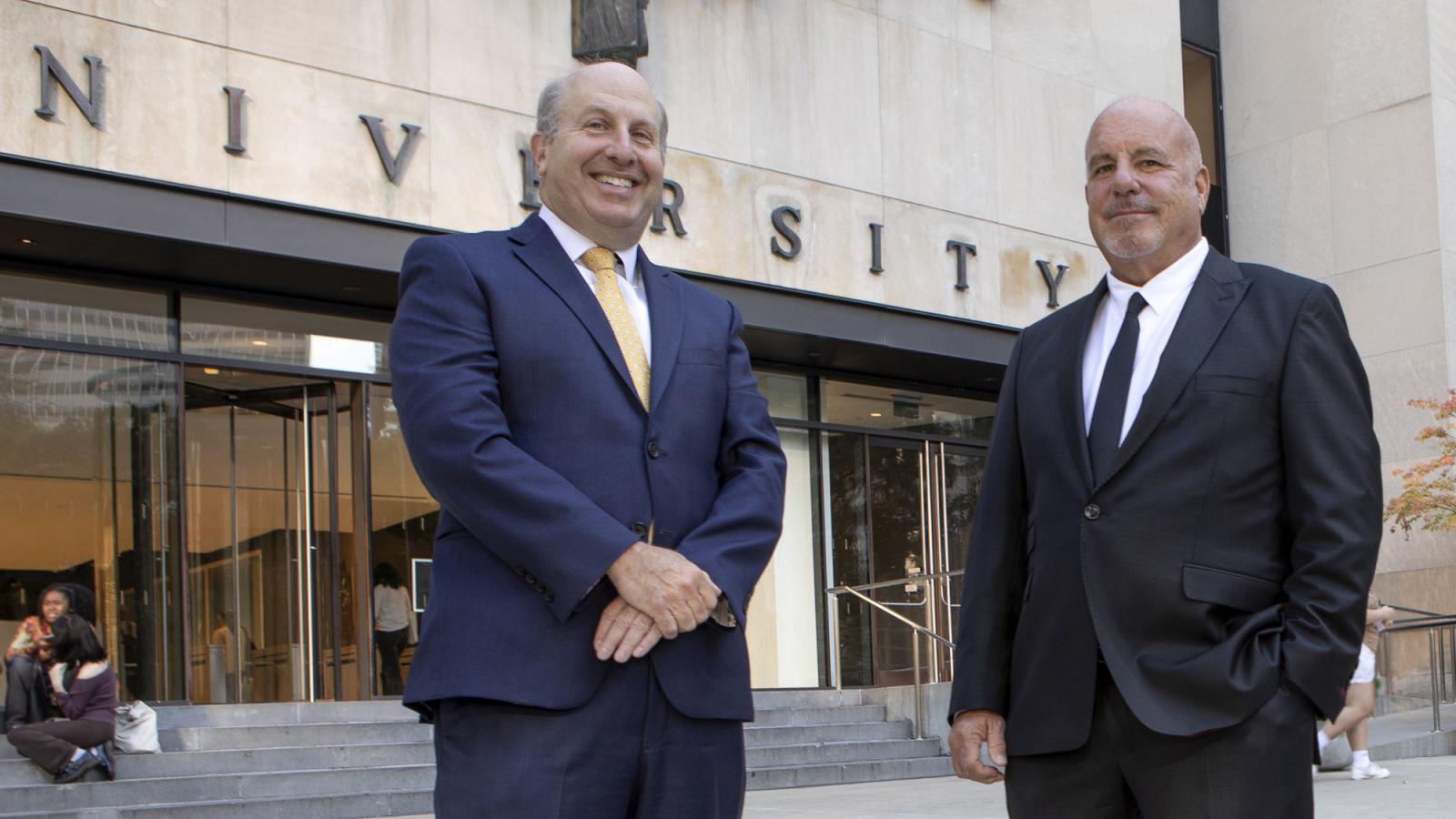
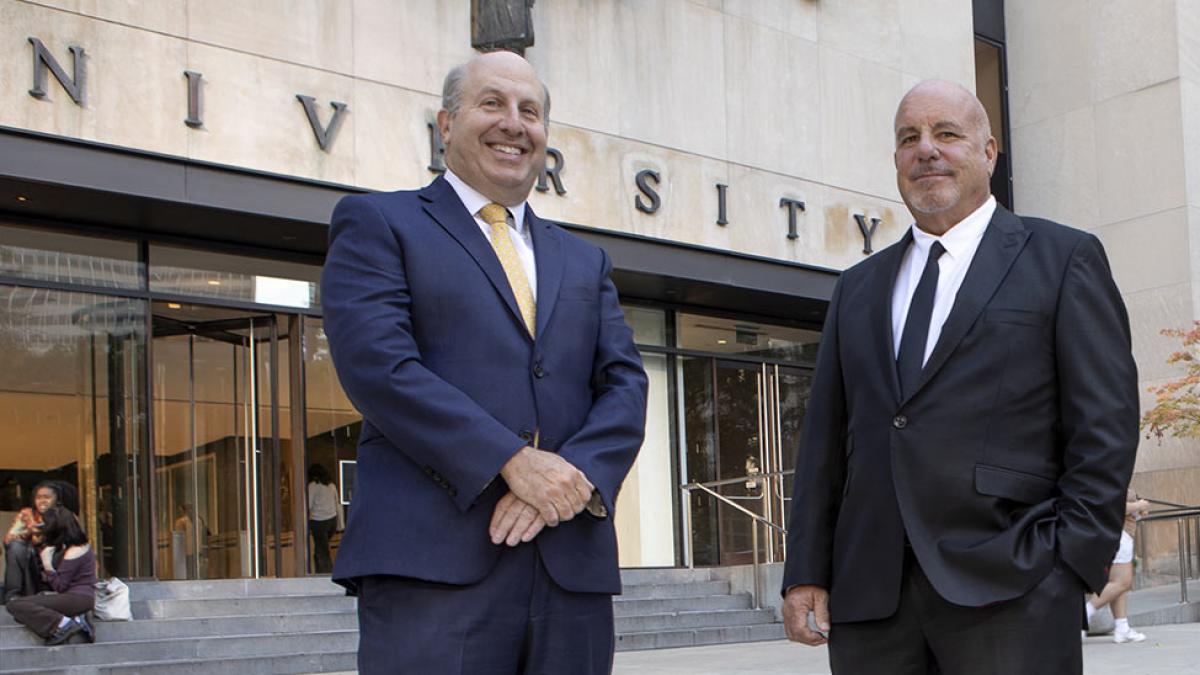
As we share the latest edition of Pace Magazine, we do so with immense pride in what the past year has meant for our University and the Pace Community. From classrooms and research labs to stages, boardrooms, and legislative chambers, our students, faculty, staff, and alumni continue to push boundaries, lead with purpose, and chart bold paths forward.
Summer at Pace is a time of continued momentum, but also a moment to pause. We encourage everyone in our community to take space this season for rest, reflection, and renewal. As we prepare for the fall, we recognize the value of slowing down in order to move forward with focus.
This summer also begins a period of meaningful transition. As we look toward 2026, our 120th year, we are not just honoring a proud history, but doing the work to ensure Pace is strong and evolving for the decades ahead. The world our students are entering is changing, and we are committed to preparing them with the education, experiences, and values to shape that world with confidence and care.
This includes a continued emphasis on academic excellence. Over the past year, six of our programs, spanning law, public administration, nursing, and economics, rose in the U.S. News & World Report national rankings. This recognition is not just a reflection of reputation, but of the real-world readiness, rigor, and impact that define a Pace education. It is a testament to our faculty’s innovation and our students’ ambition.
The stories in this issue offer glimpses into that work. They speak to our students’ drive, our faculty’s dedication, and the power of mentorship, research, creativity, and advocacy to open doors. Some stories are grounded in tradition. Others reflect the future we’re building.
To everyone who supports this community: thank you. We look forward to the year ahead with a deep sense of purpose, rooted in the mission that has guided us since our founding: Opportunitas.
Warmly,
Marvin Krislov
President
Rob Sands, JD ’84
Chair, Board of Trustees
More from Pace Magazine
Peek behind the curtain—and the construction fencing—at the bold reimagining of One Pace Plaza East. We asked the design team of this ambitious transformation 10 questions about what’s happening now, what’s coming next, and why it matters. Spoiler: One of the largest cranes on the East Coast makes an appearance.
From inspiring words by Etsy CEO Josh Silverman to powerful reflections from alumni, community leaders, and first-generation grads, Pace University's two-day Commencement celebration was a moving tribute to resilience, integrity, and the promise of Opportunitas. Meet the voices who lit up the stage—and the futures they’re helping to shape.
From NFL reunions and Shark Tank insights to international acclaim and life-saving heroics, the Pace Community is going further—and bringing the world with them. These 10 moments from the past semester are big on energy, even bigger on impact.
Progress in Motion: A Construction Check-In at One Pace Plaza East
Peek behind the curtain—and the construction fencing—at the bold reimagining of One Pace Plaza East. We asked the design team of this ambitious transformation 10 questions about what’s happening now, what’s coming next, and why it matters. Spoiler: One of the largest cranes on the East Coast makes an appearance.


With a little more than a year to go until opening day, the transformation at One Pace Plaza East is already reshaping downtown—and redefining the student experience for the Sands College of Performing Arts and for the University. Behind the scaffolding and steel is a team of dedicated professionals breathing new life into one of the University’s most iconic spaces. At the heart of this ambitious project is a state-of-the-art Performing Arts Center: a bold investment in the future of Pace’s thriving performing arts programs. Featuring cutting-edge classrooms, expansive rehearsal studios, and premier creative spaces, the new home of the Sands, Dyson, and University-wide program spaces will provide students and faculty with the tools to create, collaborate, and innovate at the highest level. As construction charges ahead, we caught up with the people making it happen—leaders from Campus Planning and Facilities, including Mark Malekshahi, Wayne Chen, and Ryan McEnany, along with the team at DBI Projects led by Jordan Barr—for an inside look at how this transformational renovation is progressing. In this special photo feature, we present ten questions that explore not only the progress made so far, but also the vision, challenges, and moments of awe that are bringing the future home to Pace.
What are the most significant milestones you've hit so far in the One Pace Plaza East renovation?

Significant progress has been made on the One Pace Plaza East renovation since the start of construction in Fall 2023. Overall, construction is approximately 50 percent complete. Among the top highlights are the completion of excavation and foundation work for the re-envisioned Schimmel Theater. The intricate gridiron and girder system supporting the podium floors above the theater have also been installed—an essential intervention enabling the enlarged stage, fly tower, and audience chamber.
In addition, major equipment for the building’s systems infrastructure is now in place, with roughly 80 percent installed. One of the largest free-standing cranes on the eastern seaboard was used in Spring 2025 to lift this equipment to the top of Maria’s Tower—an impressive sight to witness.
Do you have a favorite visual detail in the building's current phase that you'd love the Pace Community to see right now?
A particularly striking detail in this construction phase is the newly inserted steel structure used to expand the fly tower in the significantly enlarged Schimmel Theater. Even with only the new concrete balcony poured, one can already appreciate how intimately the audience will be connected to the stage—a standout feature of the design.
What’s a moment from construction that made you stop and say, “This is really happening”?
Two moments in particular solidified the reality of the project. The first was the commencement and completion of the Schimmel Theater’s excavation and foundation work. Based on the original footprint, this phase laid the groundwork for the future theater’s modern infrastructure and orchestra-level seating.
The second was the dramatic cutting away of floor slabs to create the double-height spaces for the Garden Theater, the Blackbox Theater, and the large dance rehearsal space for the students at Sands College.
What aspects of the Performing Arts Center or creative spaces do you think will be most transformational for Pace’s programs?

Each of the new theaters under construction possesses unique qualities that will significantly benefit both students and faculty. Whether it’s the increased fly tower height in the new Schimmel Theater or the Garden Theater’s seamless integration with the courtyard, the versatility of these spaces is designed to inspire bold and imaginative new productions.
What’s been the most complex challenge during construction to date—and how did the team overcome it?
The most complex challenge has been navigating issues stemming from existing conditions while maintaining the construction schedule. In an occupied building, there is a limit to what can be surveyed before construction begins. Despite numerous unexpected conditions discovered during demolition, the team has remained proactive—focusing on how each challenge could be resolved to benefit the long-term functionality of the building.
Are there any design features—like materials, acoustics, or environmental systems—that are particularly innovative or unique to this space?
A key sustainability feature of the renovation is the transition to an all-electric infrastructure to meet the building’s cooling demands. These energy-efficient upgrades at One Pace Plaza East will help Pace achieve its broader decarbonization goals.
From a design standpoint, one distinctive feature is the use of subtly varying floor elevations—spaces gently ramp up and down. To achieve the necessary acoustic isolation within the existing shell, specific rooms were constructed with independent floor and wall systems.

How do the renovations to Maria’s Tower integrate with the larger mission of the project?
The renovations to Maria’s Tower—from gut-renovated bathrooms to refreshed residential spaces—are essential to the University’s goal of offering vibrant, modern living environments that are in close proximity to academic and creative spaces on the New York City Campus.
How are the performance and rehearsal spaces being tailored specifically for today’s creative arts students and future performers?

The program spaces are designed not only to support outstanding performances but also to function as exceptional teaching environments. For instance, catwalks in the Schimmel Theater have been enlarged to allow more students to participate hands-on in learning about lighting and technical production—acknowledging that designing for instruction is distinct from designing for production alone.
What excites you most about how these new spaces will support interdisciplinary work—from theater to podcasting to digital design?
What’s most exciting is having such a wide range of performance, production, and maker spaces located under one roof. The proximity of a theater to a rehearsal studio, to a workshop, to a makerspace, to a podcast room is expected to spark collaboration and enthusiasm across disciplines—fostering a vibrant, creative campus culture.
What role does sustainability play in this project, and how does it contribute to Pace’s broader climate goals?
Sustainability plays a pivotal role in this project, with a strong commitment to achieving LEED and WELL certifications. Achieving these certifications will significantly enhance the quality of life, teaching and learning at Pace. Beyond just achieving these types of certifications, the project is making an extraordinary commitment to transition to an all-electric system, effectively removing the campus's reliance on steam and substantially reducing its carbon footprint. This is a focal point and objection of all of Pace’s major projects.
Want to learn more about the new spaces set to open in Fall 2026? Visit our page dedicated to all things One Pace Plaza East.
More from Pace Magazine
From NFL reunions and Shark Tank insights to international acclaim and life-saving heroics, the Pace Community is going further—and bringing the world with them. These 10 moments from the past semester are big on energy, even bigger on impact.
The world is changing fast, and Pace University is preparing the leaders who will change it for the better. From healthcare to public service to law, our students aren’t just keeping up—they’re stepping up, driven by purpose, compassion, and the power to lead the future.
As the demand for skilled accountants surges and the talent pipeline shrinks, Pace University is stepping up. With a legacy dating back to 1906, the Lubin School of Business is leading the charge—equipping accounting students with in-demand skills in AI, data, and ESG. In a changing profession, Pace continues to deliver the talent the industry needs now and next.
Unprecedented Times Call for Unprecedented Leaders
The world is changing fast, and Pace University is preparing the leaders who will change it for the better. From healthcare to public service to law, our students aren’t just keeping up—they’re stepping up, driven by purpose, compassion, and the power to lead the future.
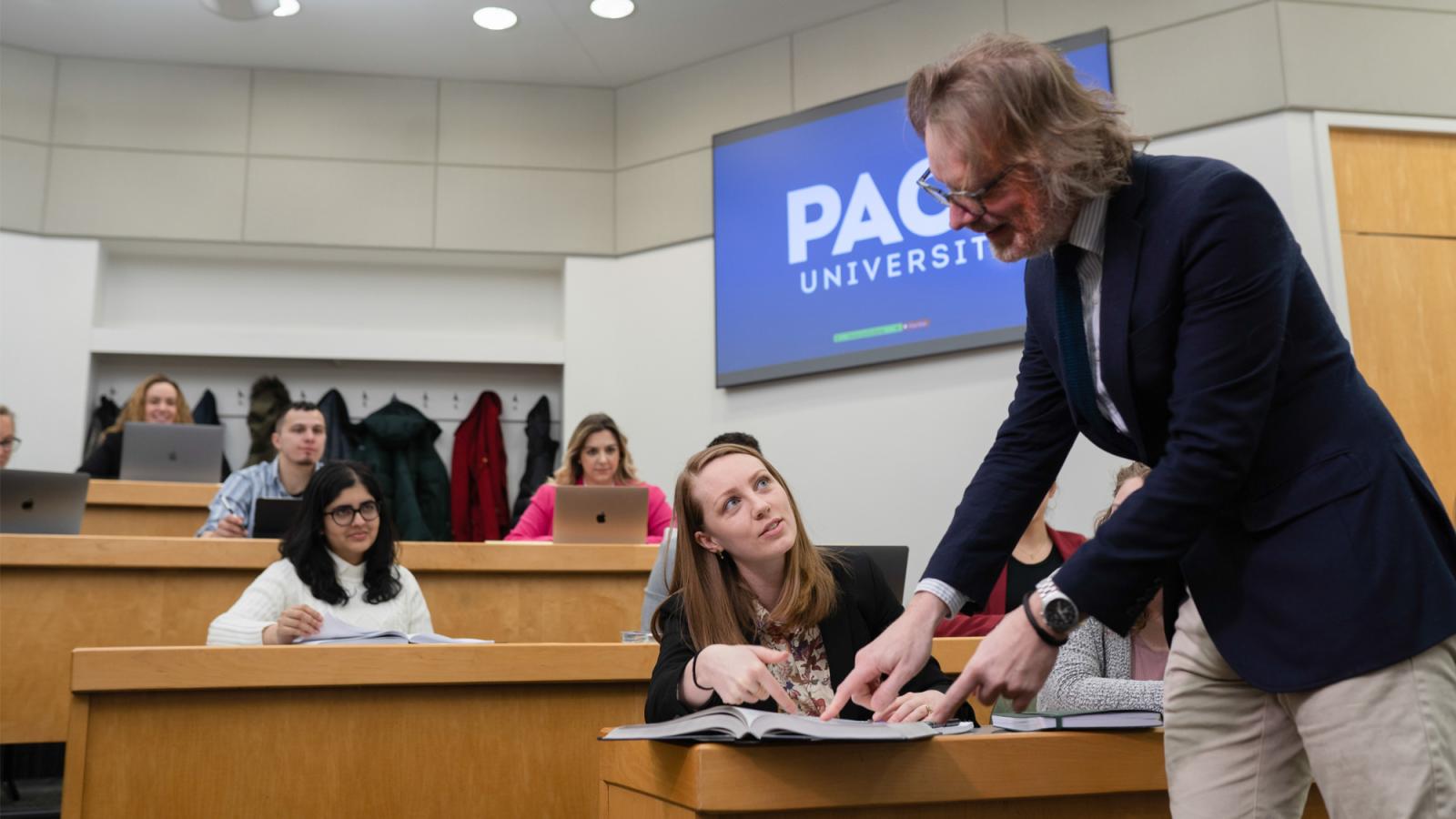

The world is changing—fast. From global economies to civic institutions, today’s landscape is evolving in ways few could have predicted a generation ago. But with that change comes possibility. We are living in a moment that calls not just for professionals, but for bold thinkers, compassionate problem-solvers, and resilient leaders ready to build a better future.
At Pace University, nationally ranked programs in law, public administration, and nursing are doing more than preparing students for jobs. They’re cultivating the minds and values of those who will shape their fields—and the world—with conscience and conviction.
In classrooms, clinics, and community partnerships, students are learning to lead through complexity and to meet the future with clarity and purpose.
Across these programs, Pace faculty are helping students explore pressing challenges—from protecting democratic systems to advancing health equity—and showing what it takes to thrive as leaders in a world that’s still being written.
How Nursing Goes Beyond Symptoms
Few professions embody the pressures of these times more clearly than nursing. During the global COVID-19 pandemic, nurses weren’t just present at the front lines—they were holding the line, often without clear guidance, adequate protection, or a path forward.

That experience reshaped the future of the profession. Today, nursing is undergoing what Gabrielle Ranger-Murdock, DNP, PMHNP-BC, assistant professor and specialty track coordinator for the psychiatric mental health nurse practitioner program, describes as a fundamental shift. “We’re facing our own reckoning and rebuilding of what healthcare looks like and feels like,” said Ranger-Murdock. “For ourselves, and also for our patients.”
Ranger-Murdock, a doctor of nursing practice and board-certified psychiatric nurse practitioner specializing in reproductive psychiatry and women’s mental health, has seen how the pandemic surfaced long-standing issues: nurse burnout, structural inequities, and the growing demands of a more informed patient population.
“The pandemic brought forward nurse burnout. It raised the question: are we protected and cared for in our work?” she said. “And then we’re also reckoning with our patients, who are now more aware of what they deserve, what they should have access to—and what they don’t have access to, sometimes because of limitations within the healthcare field itself.”
We’re facing our own reckoning and rebuilding of what healthcare looks like and feels like.
—Ranger-Murdock
At the Lienhard School of Nursing within Pace’s College of Health Professions, nursing students are being prepared not only to meet these challenges, but to lead conversations around how care is delivered. That includes developing fluency in an increasingly important concept: cultural competence.
Cultural competence, at its core, is about taking more than what’s on the chart into consideration, understanding that symptoms are just part of a more comprehensive personal story. This practice goes beyond diagnoses and influences how healthcare professionals connect with their patients.
“Cultural competence is something we’ve talked about for a long time,” Ranger-Murdock explains. “We’ve come to adjust what that means. Now, it’s more about self-awareness, looking within. What are your own biases? How might they impact your ability to provide the best care possible?”
This shift toward a mindset of lifelong learning and reflection is central to how Ranger-Murdock teaches. It also reflects how nursing at Pace is evolving to meet today’s complex realities. “It’s really shifting to cultural humility, and being committed to ongoing learning,” she said. “You’re never going to stop learning as a nurse. Never.”
You’re never going to stop learning as a nurse. Never.
—Ranger-Murdock
Ranger-Murdock encourages her students to go beyond clinical prowess and to lead with curiosity and respect, considering the full range of identities and lived experiences they may encounter across race, gender, family structure, and immigration status. “How are you positioning yourself in curiosity, in listening, and in grounding yourself to make sure you’re centering the patient in their care always?” Ranger-Murdock said. “Meeting the patient where they are, always.”
Just as nurses must adapt to the evolving needs of patients, the Leinhard School of Nursing is constantly adapting to meet the needs of nursing students. "We’re undertaking a thoughtful curriculum revamp," Ranger-Murdock explains. "By expanding our program requirements—such as increasing clinical hours to 760 and enhancing simulation experiences—we’re deepening students’ skills and broadening their exposure to diverse patient populations, not just to meet the needs of today’s healthcare landscape, but to anticipate tomorrow’s."
The point is not just to train nurses to administer care but to lead and advocate, for fellow healthcare professionals and their patients alike, regardless of where they are in their career. “We’re really asking our students: how do we cultivate leadership at every level?” Ranger-Murdock said. “How can their skills be honed to foster the compassion and empathy that drives leadership in nursing?”
For Ranger-Murdock, that journey begins with self-reflection and a mindset rooted in openness—qualities that become even more essential in a healthcare field full of new challenges and possibilities.
Where Policy and Purpose Meet

Behind every frontline response is a system—funding it, staffing it, and making it work. Public administration is where those systems are built, managed, and reimagined. Today’s public leaders must navigate a shifting landscape. The challenge for students pursuing careers in public service comes down to balancing innovation with integrity.
“Some of the challenges of public administration are traditional and long-standing,” said Gina Scutelnicu-Todoran, PhD, Dyson professor and department chair of the public administration program. “Such as balancing economic efficiency with democratic values such as transparency, accountability, and fairness.”
At Pace, the Master of Public Administration (MPA) program helps students meet those challenges with a mix of analytics and insight. NASPAA-accredited and nationally ranked, the program prepares students to lead across government, nonprofit, and healthcare sectors. “We go beyond just training managers,” Scutelnicu-Todoran said. “We want to build leaders.”
Public administrators are uniquely positioned to bridge the gap between time-tested organizational structures and the transformative potential of emerging tools like generative artificial intelligence (AI). At Pace, students aren’t just reacting to how AI is reshaping their daily lives—they’re preparing to harness its power to improve the very systems they aim to lead, using innovation as a catalyst for meaningful, future-ready change. “Our students need to know how to use AI effectively, but also how to recognize its limits,” Scutelnicu-Todoran explained. “It can’t replace the ability to interpret, evaluate, and make sound decisions.”
We go beyond just training managers. We want to build leaders.
—Scutelnicu-Todoran
Through community-engaged research, paid partnerships, and applied policy projects, MPA students learn to serve the public interest while navigating real-world complexities. Leadership development is paired with training in ethics, communication, and civic engagement, skills that are increasingly urgent in an era of polarization and misinformation. “Civic education, civic engagement, community engagement—these are more necessary today than they’ve ever been,” Scutelnicu-Todoran said.
Students are also encouraged to think globally. The department is working to reintroduce international learning opportunities, particularly in emerging democracies, to help students develop a broader perspective on governance and accountability. According to Scutelnicu-Todoran, “Leadership in a global context brings a new set of challenges.”
There is no better time to get a degree in public service.
—Scutelnicu-Todoran
Whether in local government or international nonprofits, recent Pace MPA graduates are working at the Federal Reserve, the Environmental Defense Fund, and other major institutions. Their careers span public affairs, strategic planning, healthcare policy, and more.
In a time of rapid change and new possibilities, public administrators who can adapt with confidence and lead with integrity are more essential than ever. “There is no better time to get a degree in public service,” says Scutelnicu-Todoran. “This is when you can really make a difference.”
The Rule of Law in Unruly Times
The legal system is the backbone of any functioning democracy, and today’s lawyers are stepping into a profession where the stakes are nothing less than constitutional.
This is not an ordinary moment for the legal profession. Lawyers are navigating attacks on judicial independence, executive overreach, and increasing attempts to politicize the law itself. At Pace’s Elisabeth Haub School of Law, students are preparing to lead not only with legal expertise, but with ethical clarity and civic purpose.
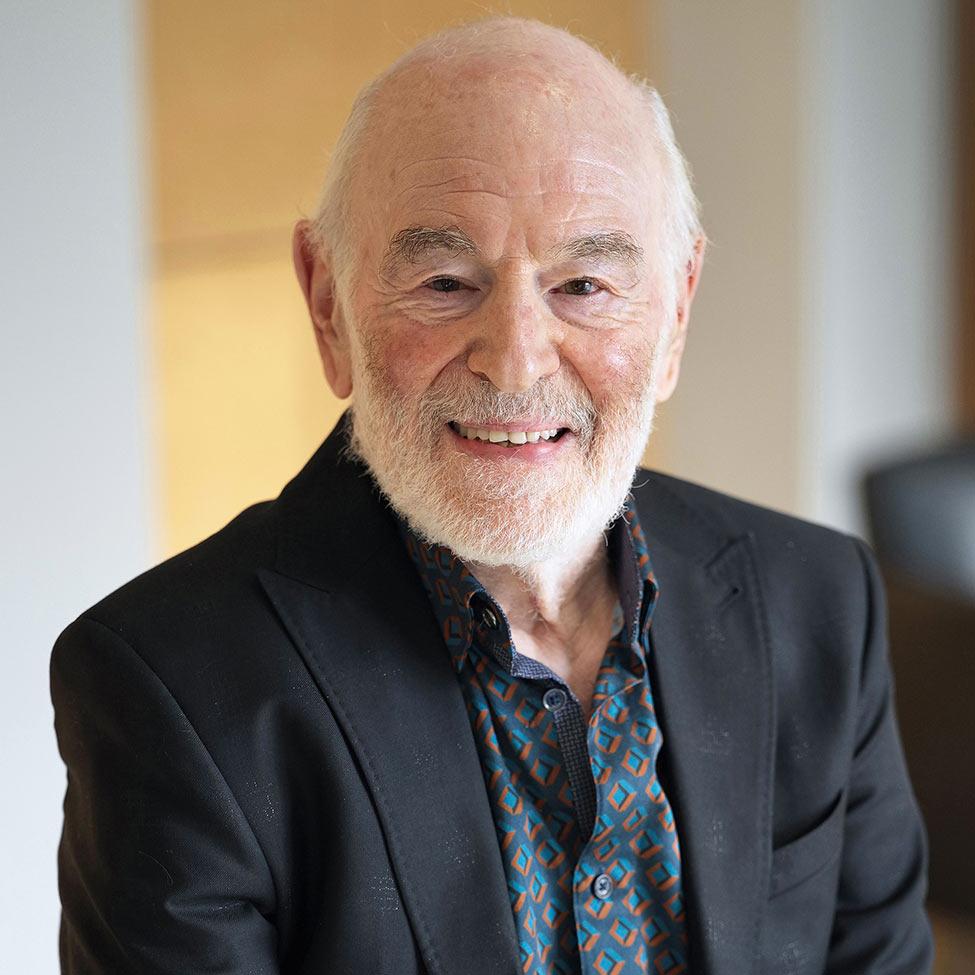
“I want my students to realize how precarious our democracy is today—how precarious the rule of law is,” said Professor Bennett L. Gershman, JD, who has taught at Haub Law since its founding in 1976. “And I want them to realize that as lawyers, they have a solemn duty. They take an oath to uphold the rule of law.”
That duty is a constant thread in Haub Law’s curriculum. The school is nationally recognized for its environmental law and public interest programs, but across all focus areas, students are trained to think critically about their responsibility within and to the legal system. Real-world experience begins early, through clinics and externships that take students into courtrooms and community advocacy settings.
“We have an immigration justice clinic—it’s been quite robust, especially under the late Vanessa Merton, and it remains strong today,” Gershman said. “Many of our students want to go into immigration representation.”
The challenges facing new lawyers aren’t just technical, but systemic. Faculty at Haub Law have responded by creating spaces for students to explore the legal and ethical dimensions of today’s political climate, such as a recent event called Lawyers, Law Schools, and the Rule of Law in Unprecedented Times. At this event, faculty provided a forum for an open conversation on the pressures facing students not just as future lawyers and judges, but also as people navigating the world.
Law is consequential. It shapes society
—Gershman
“The rule of law relies on separation of powers and checks and balances,” said Professor Lissa Griffin, JD, who teaches professional responsibility. “The first thing for everyone to think about is: Is the Constitution and is the rule of law being protected?”
Griffin and her colleagues spoke about recent attacks on the judiciary, the politicization of the Department of Justice, and unprecedented executive actions affecting lawyers’ rights and independence. “If lawyer independence is threatened, that’s very serious,” Griffin said. “We were concerned that it was so unprecedented, and worried students were maybe thinking this is just the current version of politics.” The concern faculty held was that students without the benefits of experience may think these attacks are just part of the natural swinging of the political pendulum. “We wanted to get across just how really extraordinary this time is.”
For Gershman, the challenge goes beyond politics and is about centering the law as a moral and civic tool. He urges his students to reflect on why they want to practice law, and what kind of professionals they hope to be. “Law is consequential. It shapes society,” Gershman said. “Lawyers have been enablers of tyranny and champions against it.”
We wanted to get across just how really extraordinary this time is.
—Griffin
Both professors agree: leadership in law today means knowing the rules, defending the system, and staying grounded in ethics, even when the system itself is under stress.
“We train students to be competent and ethical,” Gershman said. “If I do that, I’ve done my job.”
Braced For Change, Prepared to Lead
Across every field, the next generation of leaders will face questions that don’t have easy answers. These pressures are especially felt by college students who are reckoning not just with what they want to do, but who they hope to become.
They’ll be asked to solve problems they didn’t create and navigate the ripple effects of laws and technologies shaped by earlier decisions. At Pace, expert faculty help students do more than meet these challenges—they prepare them to lead with insight and confidence. By fostering critical thinking, compassion, and a deep sense of ethical responsibility, these educators empower students to shape a future that is not only more thoughtful, but profoundly better.
More from Pace Magazine
Pace University welcomes two new Board of Trustees members—Barbara A. Abeles, a global manufacturing executive and longtime education philanthropist, and Sabrina A. Griffin ’92, an alumna and corporate diversity leader—whose shared commitment to opportunity, leadership, and student success will help shape the future of the University.
From inspiring words by Etsy CEO Josh Silverman to powerful reflections from alumni, community leaders, and first-generation grads, Pace University's two-day Commencement celebration was a moving tribute to resilience, integrity, and the promise of Opportunitas. Meet the voices who lit up the stage—and the futures they’re helping to shape.
Not everyone gets to say they went to college with their dad—and helped inspire his second act. Discover how Sofia Speranza ’27 and her father Frank found their calling in nursing, together.
Driving Inclusion Behind the Scenes
Melanie Prado ’26 is making her mark at Warner Bros. Discovery—building connections, driving inclusive storytelling, planning high-impact events, and gaining real-world experience in the fast-paced world of entertainment.
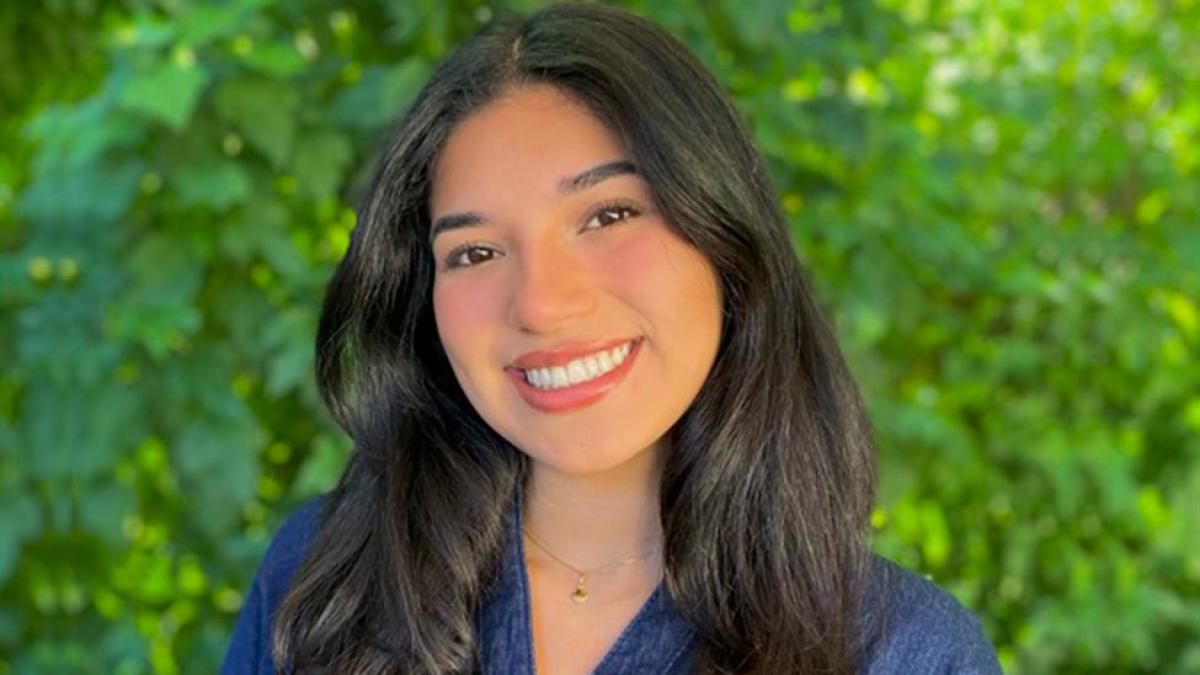
Melanie Prado
Class of 2026
Currently Studying: Arts and Entertainment Management
Current Internship Position: Inclusion Outreach Intern
Company: Warner Bros. Discovery
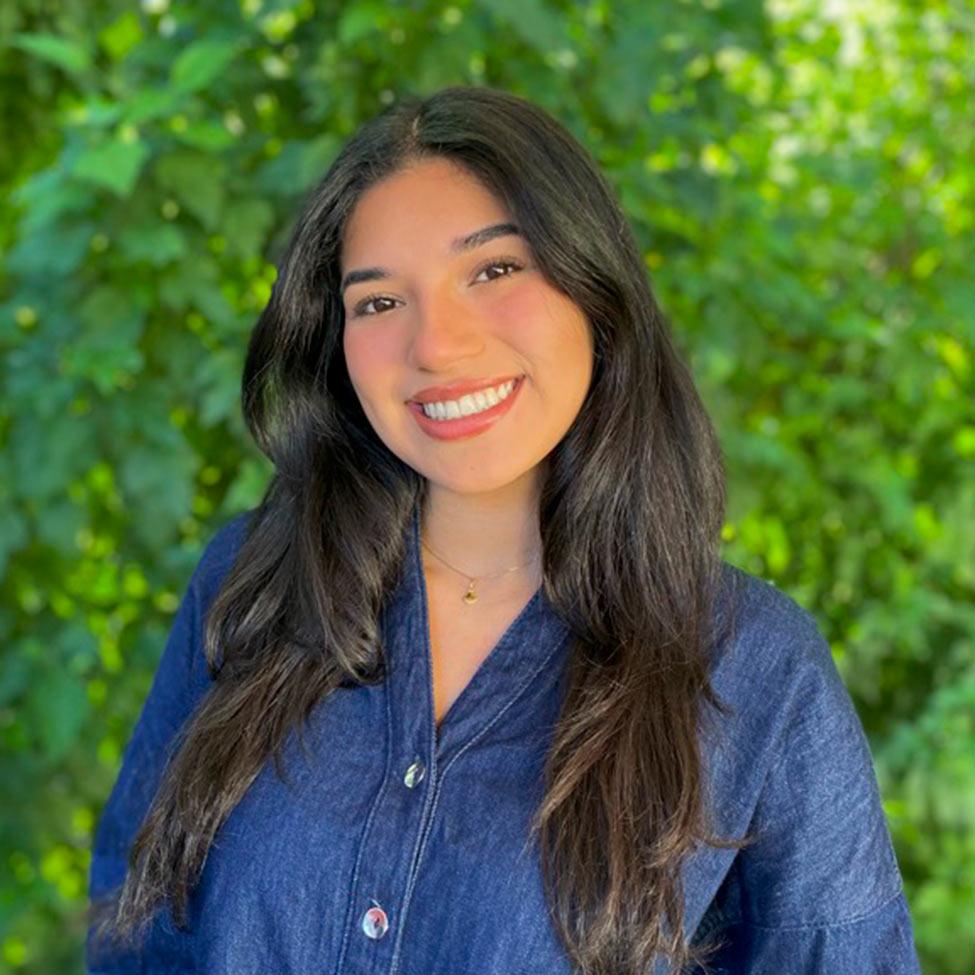
How has the Lubin School of Business helped you prepare for your current internship?
Lubin has helped prepare me for this internship through courses within the Arts and Entertainment Management program and through real-world, concept-based projects. These experiences strengthened my ability to collaborate in teams, communicate ideas clearly, and think strategically in creative environments—skills that translate directly to the fast-paced setting of my internship.
What attracted you to this internship?
As an Arts and Entertainment Management Major, I’ve always been passionate about storytelling in the entertainment industry. During my third year, I served as a Diversity, Equity, and Inclusion (DEI) Student Assistant and realized I found a space I wanted to explore further. This role blends my passion for storytelling with my drive to make an impact in the inclusion space—it was truly a no-brainer.
When I came across this opportunity at Warner Bros. Discovery (WBD), it felt like the perfect fit. I knew that learning from an industry leader like WBD would be invaluable.
Describe what a typical day looks like in this role.
A typical day includes coffee chats, moving around the Park Avenue South office, and participating in collaborative meetings. I often jump between team discussions, assist with event planning, and connect with departments across the company. No two days are the same—and that’s what I love most. I’m constantly learning, whether I’m observing how things operate behind the scenes or diving into hands-on projects. There are always exciting moments woven in too, like Pride Month celebrations, mixers, or internal screenings of upcoming films.
What has been the highlight or most enjoyable aspect of your internship so far?
Without a doubt—the people. I’ve learned so much from the stories, expertise, and kindness shared by those at WBD. It’s been incredibly refreshing to feel seen and supported in such a large company. Speaking with inspiring voices across the industry has made a lasting impact. The community here has been the true highlight of this experience.
How has this experience shaped or impacted your career goals?
This experience has brought me incredible clarity. I’ve always wanted to work in entertainment, but now I know I want to be in spaces where purpose and people come first. I’ve seen firsthand that if you stay genuine, work hard, and remain curious, you can go far. I’d love to continue working in the inclusion space and help tell meaningful stories within it.
I’ve seen firsthand that if you stay genuine, work hard, and remain curious, you can go far. I’d love to continue working in the inclusion space and help tell meaningful stories within it.
How do you plan to apply what you’ve learned during this internship to your next semester at Lubin?
So many of the terms and concepts I hear in meetings show up in class, so I’m excited to bridge those connections. I’ll return to Lubin with a deeper understanding of behind-the-scenes operations and a clearer view of how to apply classroom learning to real-world contexts.
Do you have any advice for other Lubin students who are looking to pursue internships in the future?
Absolutely. Stay curious, stay resilient, and never count yourself out. Remind yourself that the opportunities that once felt out of reach are absolutely possible. Use every resource available to you, challenge yourself, and stay focused on your goals. It will be worth it—and without a doubt, you’ll grow into the role you’ve been working toward.
